

Five Reasons Education in the Netherlands Works Well
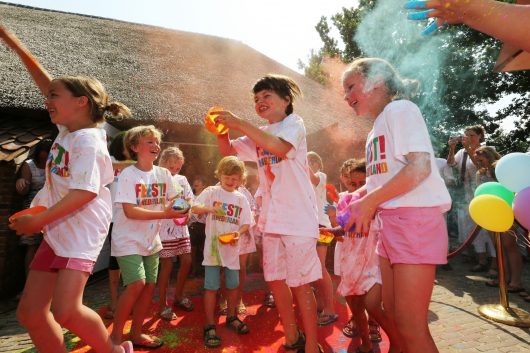
- Schools in the Netherlands give homework sparingly. In the U.S., elementary students are given more than the recommended amount of homework, which is time-consuming. Research has shown that play and exercise are vital to children’s growth and school performance. Dutch students under the age of 10 receive very little, if any, homework , which gives them time for daily exercise.
- Education in the Netherlands is fairly affordable. It is free for primary and secondary schools; parents need to pay for annual tuition only after their child reaches 16 years of age, and low-income families can apply for grants and loans. For university students, the average cost of tuition is about USD$2000 per year; in the U.S. it is close to $10,000.
- There are different types of classes Dutch students can take for secondary school before college. Students can take HAVO (senior general secondary education) or VWO (pre-university education) before they go to college. They can also take VMBO (preparatory secondary vocational education) if they do not want to attend college right away. This system allows students to work with a program that will accommodate their needs.
- Education in the Netherlands involves learning a second language. While American students usually start learning a second language in middle school or high school, some primary schools in the Netherlands teach English as early as Group 1, which is the equivalent of American kindergarten. All Dutch students learn English, but some schools require students to learn an additional language. There are even bilingual schools for every education level, where some classes are taught in English and others are taught in Dutch.
- The Dutch school week is different from an American school week. A school day in primary school usually takes place from 8:30 a.m.-3:00 p.m. on weekdays, but students go home for lunch instead of eating at a school cafeteria. On Wednesdays, schools dismiss students around noon.
The Netherlands puts its youth first when it comes to education. Young people demonstrably succeed in math and sciences while having a low unemployment rate. This, along with much more successes, places education in the Netherlands at the top compared to other countries. Other countries could learn from the Netherlands in how they put education first for their youth.
– Emma Majewski
Photo: Flickr
“The Borgen Project is an incredible nonprofit organization that is addressing poverty and hunger and working towards ending them.”
-The Huffington Post
Inside the borgen project.
- Board of Directors
Get Smarter
- Global Poverty 101
- Global Poverty… The Good News
- Global Poverty & U.S. Jobs
- Global Poverty and National Security
- Innovative Solutions to Poverty
- Global Poverty & Aid FAQ’s
Ways to Help
- Call Congress
- Email Congress
- 30 Ways to Help
- Volunteer Ops
- Internships
- Courses & Certificates
- The Podcast

Young Expat Services
Young Expat Services (YES) is specialized in helping families relocate to the Netherlands.
- 30 minute call
- School advisory report
- School packages & prices (age 0-18)
- School packages & prices (age 18+)
- How it works
- Returning to The Netherlands
- Presentations
- In school Dutch lessons
- Testimonials

Homework in Netherlands | Primary schools
Dutch school Homework: What parents need to know 🇳🇱
Are you moving to the Netherlands and curious about the homework culture in Dutch primary schools ?
This is what you need to know:
🎒 In grades 3 through 8 , most primary schools assign kids a ‘boekbespreking’ (book presentation) and a ‘spreekbeurt’ (presentation on a subject of your kid’s choice).
🎒 At most Dutch primary schools, kids will have regular homework starting from 6th grade (age 9) . This homework won’t be daily, but once or twice a week.
Dutch primary school homework is often something your child can do without your help .
However, should your child require help , and language barriers are a challenge, it is encouraged to communicate with their teacher to explore potential solutions.
Alternatively, you can also try to find a teenager in your neighborhood who is willing to help your child once a week for a small amount.
Please also read Bilingual schools in the Netherlands
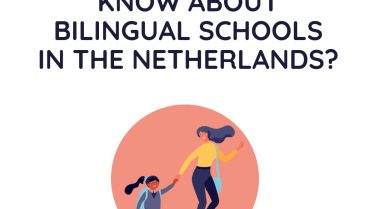
Bilingual schools Netherlands | What do I need to know?

How much does education cost in the Netherlands?
Your guide to living, working and studying in the Netherlands
Business directory, the dutch education system.
The Dutch education system is totally different to that of a country like the UK! In the Netherlands, there are several educational paths a child can choose to pursue. What’s more, kids begin to be directed down one of these academic routes very early on in their lives. If you are moving to the Netherlands with children, read on. We will explain how the primary and secondary education systems work here, and how young expats can adapt to them.
Primary Education in the Netherlands
Primary education in NL works as follows:
- In the Netherlands, children attend primary school from the age of four and until they are twelve
- They spend their first two years in kindergarden
- In their final year, pupils are advised on which type of secondary education they should pursue
- This advice is based largely on the ‘ leerlingvolgsystem’
- This is a monitoring system, which is used to register the achievements of pupils throughout their time at elementary school
- An aptitude test is also used to determine which type of school they should move on to. It is often referred to as the ‘ CITO-toets ‘ , in Dutch
Secondary Education in the Netherlands
Secondary school education is where matters begin to get complicated in the Netherlands! This diagram illustrates how it works:
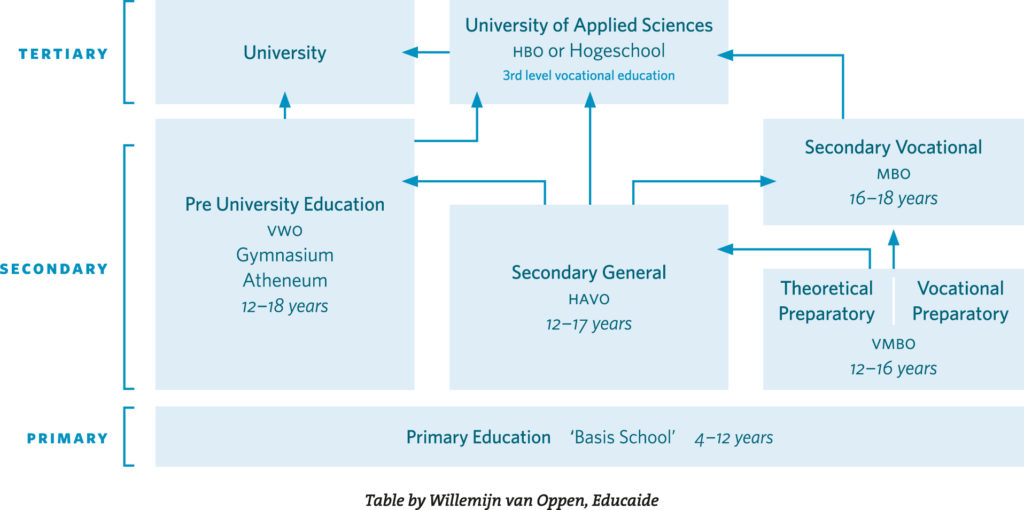
Let’s explain Dutch secondary education, in more detail:
- There are three types of secondary school pupils can choose from, once they have completed their primary school education
- All three start with a sort of ‘basic package’
- Usually, it lasts two years and consists of general subjects that all students follow
- The first year is called the ‘ brugklas ‘ . In English, it is referred to as the ‘transition class’
- At the end of this year a final decision will be made, regarding the type and level of secondary education with which a student will continue
- This gives pupils one year to demonstrate the level at which they are capable of performing, and to think about which kind of schooling they wish to pursue
- In some secondary schools, this decision is made after two years
Educational Acronyms in NL
The different types of education in Holland go by the following acronyms:
- VMBO is ‘Vocational Secondary education’
- It lasts four years
- VMBO caters for students of varying levels and abilities
- Depending on how well they perform at VMBO, a pupil might have the option of going on to attend a ‘HAVO’. You can find an explanation of HAVO education below
- Another option for them is to progress to a ‘Senior Secondary Vocational Education and Training Institution’. This type of institution is called an ‘MBO’ or a ‘ middelbaar beroepsonderwijs ‘, in the Netherlands
The other two forms of secondary education grant their pupils admission to higher education :
- HAVO lasts five years
- Pupils are enrolled according to their ability
- HAVO-diplomas prepare students for admission to a university of applied sciences. These are known as ‘ HBOs ‘ in the Netherlands
- VWO lasts six years
- VWO is considered to be a more rigorous educational path than HAVO
- The curriculum prepares pupils for a ‘ WO ‘ university
Many secondary schools offer a mixed transition class. They might, for example, have a VMBO/HAVO or a HAVO/VWO.
Dutch School for Expat Kids
In Dutch schools lessons will be taught, unsurprisingly, in Dutch. Non Dutch-speaking four and five-year-olds usually acclimatize to this pretty easily. Still, just because your child is six years of age or older, it does not mean that he or she cannot be enrolled in a Dutch school .
Unsure about which kind of school is right for your kids? Take a look at our ‘Useful Links’ box at the bottom of this page. It lists several other xpat.nl pages, which offer further advice on this matter. Our article about learning Dutch in the Netherlands might be of interest to you as well!
Dutch Immersion Classes
Many Dutch schools ask that their pupils attend a Dutch immersion class:
- Dutch Immersion classes are called ‘ schakelklas ‘ or ‘ nieuwkomersklas ‘ in the Netherlands
- After approximately one year of attending an immersion class, a child should be able to transition to a regular Dutch school
- When possible, he or she will be enrolled in a class with other children of a similar age
- Some schools have their own, internal newcomer classes. Usually, however, this is only the case at specialized schools
Immersion Classes Post Primary School
There are secondary level Dutch immersion classes too:
- ‘ Internationale schakelklas ‘ is the Dutch phrase used to describe them
- Some cities also offer a ‘ kopklas ‘
- This class is designed for highly-motivated children, who have finished primary school with high grades for math, but much lower ones for the Dutch language
- The Kopklas is intended to help these pupils to follow a higher level of secondary education
- Often, this is against the initial advice of their high school
- If they have reached a high enough academic level after attending kopklas for one year, they will be admitted to a more demanding secondary education program
- International education in the Netherlands
- Special education in the Netherlands
- Schooling for Expat Kids in NL
- International Schools in the Netherlands
- Local or International School in NL?
Find further information through the following organizations:
- Educaide : International Education Solution House
- MBO Raad : Organization of Secondary Vocational Education
- IVETA : International Vocational Education and Training Association
Recently Posted on XPat.nl
- The Difference Between a Resume and a CV
The Holland Handbook 2024
Dutch taxes.
- Dutch 30%-ruling Tax Facility
The UnDutchables 9.0
- This is your checklist for moving to the Netherlands

It is that time of year again; the new and annually-updated version of The ...
> READ MORE
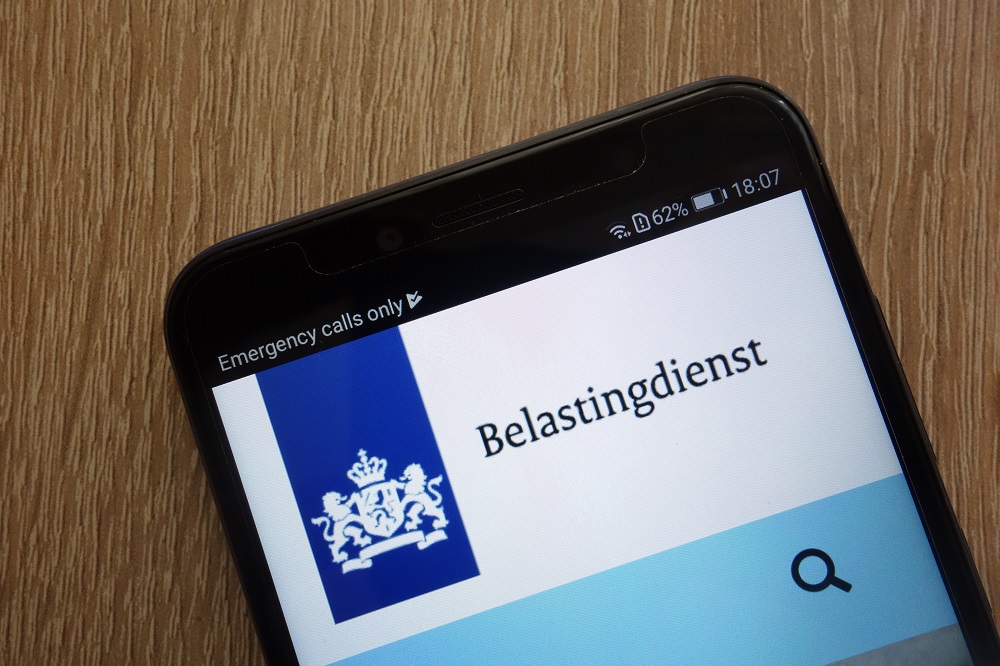
Taxes are always complicated. If you have moved to the Netherlands from another country they ...

Following the legendary previous eight editions of The UnDutchables, the 9th edition of this all ...

Making the most of your Dutch home
Whether you are renting, staying in a long-term AirBNB or have just bought a ...

Gift giving in the Netherlands-all ...
If you feel like skipping your birthday, you may be in for a challenge when ...

10 things you will find in every Du ...
The Dutch are very fond of houseplants, the more the merrier! You will find the ...

Obtaining a Mortgage as an Expat in ...
Obtaining a mortgage as an expat in the Netherlands can be a complex process, as ...

Help me move to the Netherlands!
Obviously, the decision to move to the Netherlands is not one to be taken lightly ...
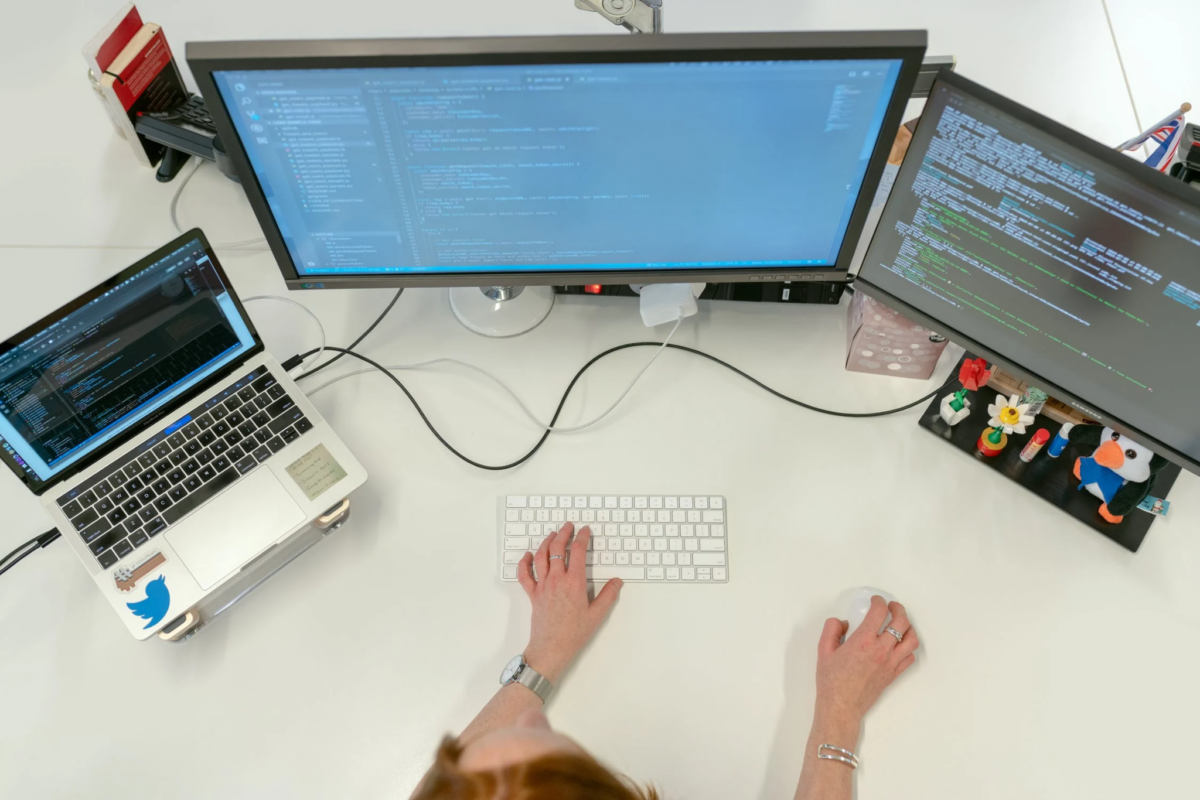
The Impact of Technology on Educati ...
Education is unending and pivotal in society. Technology is one of the most dynamic entities ...

Five Renovation Tips to Increase yo ...
Learn how much home renovations cost – and which repairs increase the home value, and which ...
The basics of the Dutch education system
There is a lot to tell about the Dutch education system, which is very different from most other countries. On top of that, some of the policies vary per city.
In the article below we’ll explain the basics. To learn more about some specific topics, click on the respective links to one of our articles, videos or podcasts.
Elementary school (basisschool):

Photo by Element5 Digital on Unsplash
As confusing as it may sound, most children start elementary school (called ‘basisschool’ in Dutch) the day after their 4th birthday, whenever that is throughout the year. From the first school day of the month after their 5th birthday, a child is obliged to go to school (leerplicht). This means that for the first year (i.e. when your child is four) you are a bit more flexible in terms of school attendance. You can discuss together with your child’s teacher what works best for your child.
Elementary school has eight grades, group 1 through group 8 (age 12). Most schools combine groups 1 and 2 in the same class, the so-called kleuterklas.
Group 1-2 is comparable to kindergarten, where they focus on learning through play, social skills, gross and fine motor skills, structure, independence, and gradual preparation for reading and writing. Formal reading and writing start in group 3, at age 6.
The homework policy varies per school. Some elementary schools don’t give any homework, while some others take it more seriously. Usually, homework starts around group 5 (age 8). Often it isn’t more than 30-60 minutes per week, and announced at least one week in advance.
Be aware that in high school, the students get a lot of homework.
The government monitors all schools, and funds about 99% of them. Some schools are based on religion (like Catholic, Protestant or Islamic schools) or an educational philosophy like Montessori, Waldorf or Dalton.
At Montessori schools, for example, children are taught to become independent, and they often work at their own pace, next to group lessons. Waldorf has a strong focus on nature and mainly teaches through stories, poems, recitals, and plays. In Dalton schools, they learn to make their own realistic plans and schedules, and work in groups on projects. In Jenaplan schools, the community plays an important role.
The national average number of students in a government-funded school class is 23-24. In many bigger cities you’ll find more children per class. Most schools use 28-30 as their maximum.
In the handful of private, fee-paying schools, class sizes are smaller.
Central End Test for Primary Education

Photo by Chris Liverani on Unsplash
In group 8, the last year of elementary school, the pupils take the Cito (‘Centrale Eindtoets Basisonderwijs’, or ‘Central End Test for Primary Education’). This is an aptitude test that measures what the pupils have learned in the past eight years. Next to Cito, there are a few other recognized test providers including Route 8 and IEP. All schools are obliged to take the end test of group 8 (also the ones based on, for example, the Montessori or Waldorf philosophy).
Based on the outcome of this end test and the recommendation of the teacher, the pupils get a school advice/recommendation (‘schooladvies’) for the appropriate level of secondary education. The assessment of the teacher is the decisive factor.
They base their advice on various elements, including the pupil’s test scores from group 6, intelligence, their attitude toward learning, eagerness to learn, interests, and motivation.
Children who have lived less than four years in the Netherlands are not obliged to take the end-of-elementary-school test. In this case, their teachers will determine which stream of high school will be most suitable for them.
School attendance law
The Dutch school attendance law is very strict, and the same for all. Children may only take time off from school if they have a specific reason, like for example a family wedding, or a funeral, or when their parents can prove they cannot go on vacation during the summer because of their job.

The Dutch summer vacation lasts six weeks, and after every 6 or 7 weeks of school, the pupils have 1 or 2 weeks off to relax and recharge their batteries. The school year starts late August/beginning of September (this changes every year) and lasts 40 weeks in total.
Starting Dutch school from age 6
(click on the link for an explanatory video)
Is your child 6 or older and you want to send him/her to a Dutch school, but s/he doesn’t speak Dutch yet? Then s/he will most likely be referred to a newcomer class first. Here, children learn the language in small classes from specialized teachers. The newcomer class takes on average one year. Usually the pupils are promoted to the next grade after that. There are a few schools that have an internal newcomer class, and a couple of separate schools for newcomers.
In some cities, the newcomer classes start at age 4.
Special needs
The experience and expertise schools have with children with special needs varies greatly. Under the ‘Inclusive Education’ (Passend Onderwijs) Act, the school where you apply is responsible for providing a suitable learning place for your child. If needed, they can buy in the support of external, specialized SEN teachers. These are usually only available for a few hours per week, though.
If the support required turns out to be too intensive or specialized, children might be referred to a dedicated special needs school. There are different types of special needs education based on the type of special needs.
At these schools, the class sizes are smaller than at regular schools, and the children receive more tailored and specialized support, as well as therapies focused on their specific needs. The teachers teach at different levels in the class, and most children follow the national curriculum. Sometimes the pupils of the special needs school stay there for the whole elementary school period, followed by a special needs high school, while other pupils transfer to a regular school after a few years of intensive support.
After-school care:
Schools may decide on their own school hours; most choose from 8:30-9:00 a.m. to 2:45-3:15 p.m. Many schools are closed on Wednesday afternoons.
If parents work, their children can go to after-school care (BSO), which is run by an external daycare organization. In some cases, the after-school care takes place at the same school, but more commonly the BSO picks up the children from the school, and takes them to nearby facilities. You’ll have to arrange and pay for BSO separately. Be aware that many BSOs have a waiting list.
Other options are a gastouder (childminder), or arranging fixed days of playdates with other parents.
If both parents work (or the single parent of a single parent family works), they should be entitled to a tax rebate for the BSO fee through the Belastingdienst. You can also apply for this tax rebate for officially registered gastouders.
High school – Dutch Secondary Education (middelbare school/voortgezet onderwijs)
(click on the link for a podcast)
Like elementary schools, some high schools are religious, or based on an educational philosophy. Whatever type of elementary school your child has attended, they can go to any type of high school—you don’t need to stick with the same philosophy if you don’t want to.

Source: Wikipedia
There are basically three levels of high school education, which go by the acronyms of VMBO, HAVO, and VWO.
VMBO is vocational education, and takes 4 years. HAVO is more generic and takes 5 years. VWO, which takes 6 years, is pre-university education.
Many schools combine multiple levels in the first year (called brugklas), and the streaming takes place in the 2 nd year.
Currently they are discussing about making the system more flexible, so, for example, you can take your subjects at different levels (e.g. math at VWO level and languages at HAVO level).
At VMBO schools, students can choose between more theoretical or more practical subjects. And then they also choose a sector in which to specialize: Technical (e.g. construction, graphics, automotive, electrical), Agriculture (e.g. agriculture, environment, and food technology), Economics (e.g. administration, commercial services, fashion) or Care and Welfare (e.g. care, sports, services, safety).
After the theoretical level of VMBO, students may either go to the 4 th year of HAVO, or to the MBO, where they can obtain a trade diploma. With a theoretical MBO diploma, you may move onto HBO, which is a university of applied sciences (see below).
About halfway through their HAVO or VWO course, students have to choose a ‘profile’ in which they will eventually graduate. The options are: Culture and society, Economics and society, Nature and health, and Nature and technology.
With your HAVO diploma, you may go to 5VWO, or to HBO, which is a university of applied sciences. A lot of people working in business and trade are HBO graduates. Some HBO institutes also offer a master’s program, for which you often need to have some relevant work experience. You can also do your bachelor’s at HBO, followed by a master’s at university. Also with your certificate of your first year of HBO (propedeuse), you may continue your education at university.
VWO is in general more analytical and research-oriented than HAVO, and is comprised of two ‘branches’: Atheneum and Gymnasium. Gymnasium offers Latin, Ancient Greek, and Classical studies, while Atheneum does not. But both give equal access to (research-oriented) university (WO).
International Education:

Photo by stem.T4L on Unsplash
International education is well established in and around the big cities in the Netherlands. There are both private and subsidized international schools.
The subsidized schools are intended for children who live temporarily (2-3 years) in the Netherlands because of their parents’ jobs, although they won’t kick them out if you end up staying longer. The fees of these schools are around 4,500 to 5,500 euros per year, per child. You can find more information about Dutch state-supported international schools here .
For the private international schools, the parents need to pay for everything, so their fees are much higher, generally starting at 15,000 euros per year. These schools usually have shorter waiting lists and offer more facilities, and after-school activities.
Then there are also some international schools which are subsidized by the government of the country they are related to, for example, the French, German and Japanese schools. The European schools are funded by the European Union, and free for the children of parents who work for a European agency or institute. Other children pay between 5,000 and 7,000 euros per year, but in case of limited availability, they have to give priority to the children from the ‘target group’.
You can find a full list of international schools, including the private ones, here .
Are you hesitating between a Dutch and international school? Watch this Doodly video , or if you prefer to read the text, there is a written version here: https://new2nl.com/international-school-go-dutch.
Do you need professional support to find the right school for your children? Book a call with Annebet van Mameren now.
We also offer bespoke consultancy sessions to the employees of our corporate clients, in-company presentations, seminars, and accompanied school visits.
for more information, get in touch

The education system in the Netherlands
The education system in the Netherlands begins with kindergarten and, by the age of four or five, children have moved to Stage 1 -elementary school- where they will spend the next seven to eight years. Full-time education is compulsory from 5-16, and from 16-18 young people must attend some form of school for at least two days a week.
The education system in the Netherlands is overseen by the Inspectorate of Education which has the power to shut schools or to oblige them to modify their management or curriculum. There are, broadly speaking, three main types of schools:
- Public schools
- Special schools -which are religious rather than focussing on special needs
- General schools – which are not religious, or simply neutral
In addition, there are Islamic schools and a small number of private schools, which include around 150 international schools. There is no automatic moving up a grade at the end of each educational year. Retakes are common, in spite of the fact schools offer additional support and extra teaching to those children who are finding it hard to keep up with their peers.

Education in the Netherlands
Elementary school consists of eight grades, or groups, and at the age of 12 children sit the Cito test, or the School Final Test, to determine where their abilities lie and what kind of secondary school is most suitable for them. Parents and teachers are permitted to have a say in this decision, although parents do not always take advantage of this opportunity. Many educators believe that 12 is far too early to determine a child’s IQ and skills, and the system makes allowances for this, by ensuring there is an uncomplicated process for moving from one secondary school to another. Unfortunately, this does not take into account the fact that a child whose education has focussed on vocational training will inevitably lag behind their classmates when they change schools. Some estimates state that 40 per cent of children are placed in the wrong type of school. Equally, while children may be slow developers and need to go up the system, other children can be moved down if they cannot cope with the type of education they were assigned at the age of 12.
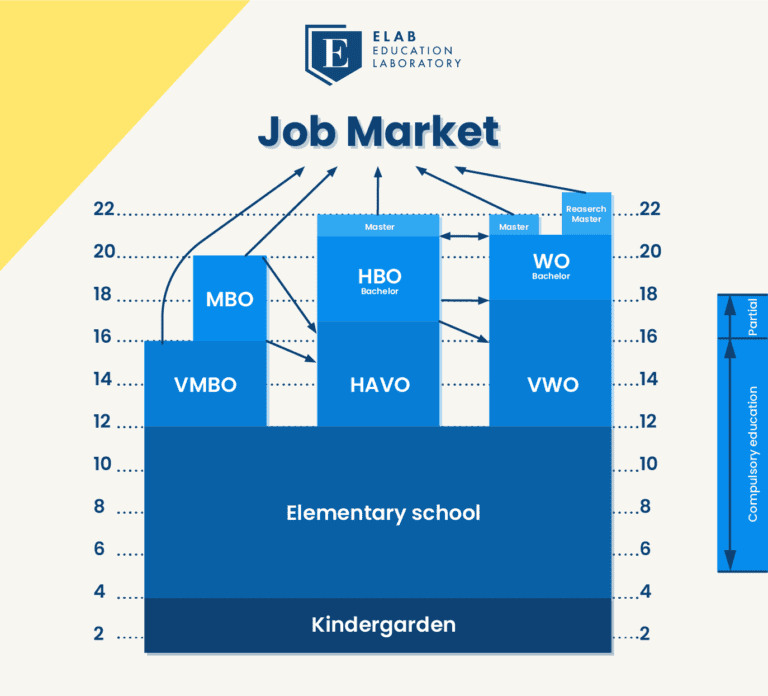
Education system in the Netherlands
Courses are taught In small classes and there is a strong emphasis on team and project work, as well as innovation and creativity.
The education system in the Netherlands – Secondary Schools
There are three types of secondary schools in the Netherlands.
VMBO schools provide pre-vocational education. Sixty per cent of Dutch children will attend a VMBO for four years. These schools teach the arts and sciences, languages, history, and maths, and provide a mixture of vocational and academic training . They have four streams, where the balance between the two types of learning differs:
VMBO-TL – mainly theoretical teaching and learning (academic).The theoretical learning path.
VMBO- GL – this falls halfway between the TL and KBL approach, see below. The mixed learning path.
VMBO-KTL – equal emphasis on theory and vocational practice. The middle-management oriented learning path.
VMBO-BBL – mainly vocational training. The basic, profession-oriented learning path.
HAVO schools are attended for five years and are the gateway to applying to Universities of Applied Sciences. These senior general education schools have five grades and students can apply to transfer to a VWO, which offers pre-university education. The schools follow a core curriculum in the three lower years, and then students can choose between four directions: science and technology; science and health; economics and society; and culture and society. HAVO students also take two subjects linked to the combination they have chosen and sit seven examinations in order to gain their school leaving diploma.
Both HAVO and VWO students have to take a number of compulsory subjects:
- Culture and the Arts
- Social studies.
VWO schools. Students attend their VWO school for six years and the VWO diploma is accepted for entrance to a research university. Certain schools, particularly those close to the border with Germany, teach up to half of their classes in German, while others teach a number of classes in English. Since VWO school programmes last for a year longer than those of HAVO schools, there is a greater emphasis on in-depth knowledge and preparation for studying at university level. After finishing the core curriculum, students choose one of the four subject clusters or profiles (see above) which are taught at a higher level than in HAVO schools.
The VWO is divided into two styles of programme: atheneum and gymnasium. Atheneum programmes include compulsory Latin and Greek . Certain schools also offer the VWO-plus, which teaches philosophy, research methodology and additional foreign languages. This is not an official school level and cannot be found throughout the Netherlands.

Understanding the Dutch Education System
Dutch universities are world-renowned for high quality teaching and research. Many degrees are taught in English and more than 100,000 international students choose to study in Holland every year.
Education in the Netherlands – Higher Education
Mbo- middle-level applied education..
This is the natural route of progression for students who have attended a VMBO and prepares students for a range of skilled trades or to play supporting role in a number of professions, such as nursing, engineering, architecture, criminology, or medicine. The MBO lasts for 1-4 years and runs at four levels:
Level 1 -assistant training, 1 year duration.
Level 2- executive training.2-3 years.
Level 3 – independent working, 3-4 years.
Level 4 -middle management -3-4 years. Students who have finished Level 4 can go on to enrol in an HBO or start working.
There are two types of MBO: apprenticeship training, where over 60 per cent of the course is practical and carried out in a working environment; or school-based education, where training takes up between 30-59 per cent of the curriculum.
HBO-Higher professional education
HBOs are also known as Universities of Applied Sciences.
HBOs are general institutions which specialise in specific fields, from agriculture to performing arts, game design and architecture to life sciences. Courses are taught In small classes and there is a strong emphasis on team and project work, as well as innovation and creativity. Unlike research universities, HBOs prepare their graduates for specific roles within the job market and have strong links with industry . HBOs constantly monitor the job market to ensure their graduates are meeting its needs and learning the skills which are most in demand. The focus is on problem-based learning , and work placements, both at home and studying abroad, are commonly offered as part of your course. Students usually go abroad after the end of the second year. These are not research institutes, unlike their WO counterparts, and teaching is hands-on rather than purely theoretical.
There are more than 40 Universities of Applied Sciences in the Netherlands and graduates are awarded degrees which cite their field of study. For example, if you get a bachelor’s studying nursing , you will have a Bachelor in Nursing, and not a BA or BSc.Courses usually last for four years. Similarly, if you pass your Master’s, which takes between 1-2 years, you will get a Masters in a specific field, e.g.: Master in Social Work, rather than an MA or a MSc. It is not possible to do a doctorate at an HBO.
Applications to universities of applied sciences must be uploaded between March and July. Admissions boards are far more interested in the number of hours you have spent studying a subject than simply a list of actual and predicted grades and will ask you to give a description of the subjects you have taken, and how long you spent on courses related to the field to which you are applying.
Among the most popular universities of Applied Sciences are:
- Hanz, Groningen
- Amsterdam University of Professional Education
- HU, Utrecht
- Avans , Breda/Tilburg/Hertogenbosch (named best University of Applied Sciences in 2021)
- Breda, Venlo/Hertogenbosch
Universities of Applied Sciences are not included in most rankings published abroad, and those which do exist are in Dutch.
WO-Research Universities
You can get your undergraduate degree in three years at a research university, whereas a Master’s takes between 1-2 years. The Netherlands’ research universities are very similar to traditional institutions of learning, found all across the world, with an emphasis on research and independent study. The table, below, provides an overview of recent rankings – but remember that the ranking of your course is just as important as that of the institution. Elab can provide you with detailed analysis of the best universities to apply to in the Netherlands, once you have chosen which degree you wish to study. The choice is wide, since at present there are over 370 undergraduate courses taught in English in the Netherlands, and 1500 at Master’s level.
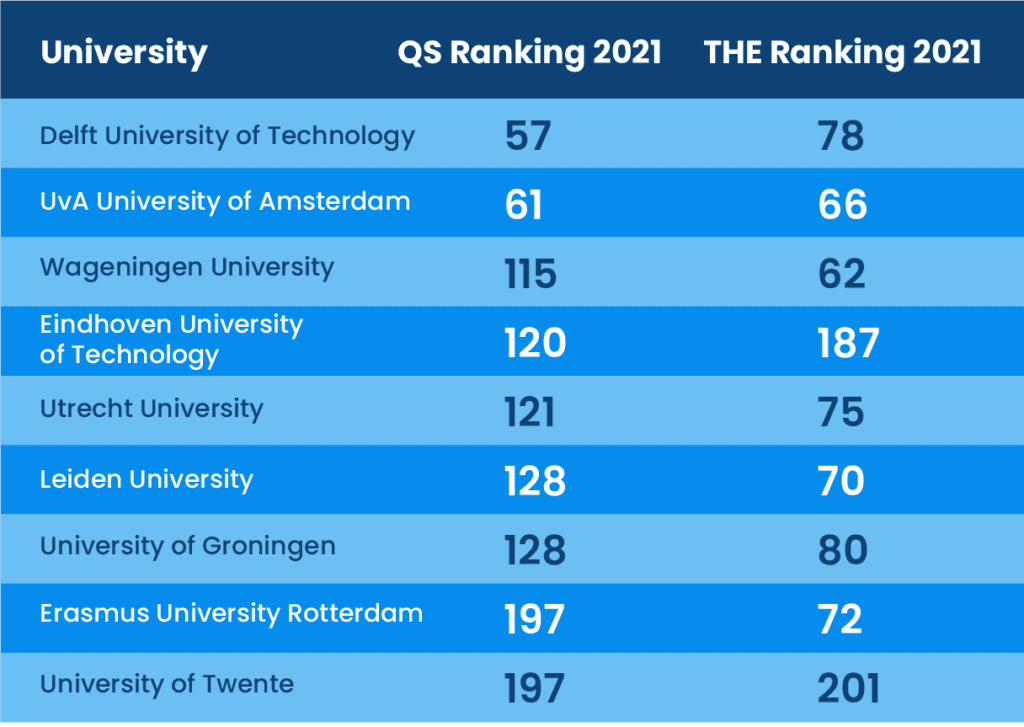
The education system in the Netherlands: Applying to university
The application process is centralised through the Dutch admissions system, Studielink.You will need to provide some, or all, of the following documents:
- Academic transcripts
- Passport or ID
- Up to four photographs
- Proof of English language proficiency (IETS 6+, CAE grade C etc)
- An essay or a personal statement
- Proof of finances – if necessary.
Each applicant is allowed to apply to four courses a year, but only two of these can be “numerus fixus” – limited number courses. If you do wish to be considered for a numerus fixus course, your application has to be submitted by 15 January. You will be given a number and place in a queue , based on the information you have provided, and will go up the list if other applicants drop out or reject the place.
I May is the general deadline, although certain universities are more flexible and accept applications uploaded after this date.
The education system in the Netherlands -Tuition fees and living costs
EU citizens pay the statutory tuition fees, which were approximately 2168 euros in 2021-2022, and are expected to be 2209 in 2022-2023. At present the Dutch central government is offering all first-year undergraduate students a 50 per cent discount on their tuition fees, as a result of the pandemic. Non-EU students pay the institutional fee, which is far higher.

How expensive is it to live in the Netherlands?
An average room in Holland costs somewhere between € 300 and € 600 a month. The costs depend on the city where you study, what is included in the rent and the arrangements made by the institution.
A recent poll of students in the Netherlands broke down their monthly expenses (in euros) as:
- Food 180 euro
- Accommodation 350-800 euro
- Tuition 200 euro
- Insurance 80 euro
- Clothing and entertainment 100 euro
- Books 50 euro
It has been estimated that studying in the Netherlands costs in the region of 1000 euros a month, inclusive of tuition fees – a very reasonable sum. And, of course, you are entitled to apply for a range of financial grants and loans.
Financial help to study in the Netherlands
All EU citizens are entitled to apply for the Collegegeldkrediet , a loan to cover tuition fees , as long as:
- You are under 30 years old
- You have a Dutch bank account
- You have a BNS, a national social security number which you will get once you register your permanent address in the Netherlands. The BNS is essential for all types of administrative tasks, from getting a mobile phone contract to finding work. The process is straightforward
You cannot apply for the loan until you have received a confirmed offer of a place at a Dutch university, and up to 31 January in that academic year.
You can also apply for the Studiefinanciering grant if:
- You work in a registered job. Do not assume this will be easy, since Dutch employers prefer their staff to speak Dutch, so if you have the time and motivation, it would be extremely useful to pick up at least a smattering of Dutch before you leave for the Netherlands. Put your summer break to good use!
- You register for income tax and national insurance – even though you will not pay these, as a student, unless your earnings are very high.
- You work at least 56 hours a month, 12 months a year. This stipulation is often overlooked by students, who assume that they will still be able to have a Christmas break back at home and a six-week summer holiday. This is not the case, if you want to keep on being eligible for the grant.
- You can apply for the grant three months after you have started working, no earlier, since you will have to produce three months’ worth of payslips to submit the application for financial aid.
Application process
Elab will take you through the process of applying for the loan and the grant ,and explain repayment schedules, how much you are likely to be given per month , etc. Call or email Elab for further information or estimates of how much financial help you are likely to be offered .
Click one of our contacts below to chat on WhatsApp
Stai cercando informazioni sulle università all'estero? Hai trovato il posto giusto! 🤓

5 Impressions of the Dutch Educational System
When I wrote “ The 8 Secrets of Dutch Kids, the Happiest Kids in the World “, I received quite a few disgruntled complaints, especially in regards to my 4th secret -“Dutch kids feel no pressure to excel in school and have very little stress. They have no homework or have very little and thus have plenty of time to play after school.”
Since my time is actually very scarce (I am an expat mom with absolutely no family help, a workaholic husband and a precocious toddler), I decided to dedicate a blog post directly addressing the comments about the Dutch educational system.
I’m convinced that part of the underlying reason for the resounding happiness of Dutch kids is because they are in a relatively, stress free educational environment that emphasizes learning and here are my five reasons why:

1. Dutch researchers reiterate the stance that pressure on academic performance is not as high as compared to the rest of the world.
Utrecht University , the Trimbos Institute and the Netherlands Institute for Social Research participated in a comprehensive study where 200,000 children aged 11, 13 and 15 from 39 different countries were surveyed. The children were asked how happy and healthy the children felt, their relationships with their parents and friends and their overall school experience.
According to Professor Wilma Vollebergh of Utrecht University , “The Netherlands has a social culture, with open and safe relationships between parents and their children, and the same applies to the relationships that children have with each other. The pressure to perform is also not as high here .”
I’m trusting that the Dutch kids surveyed were honest about their answers and that these Dutch researchers know a thing, or two about the Dutch educational system. Wouldn’t you?
2. For the most part, Dutch students under the age of 10, receive very little or almost no homework .
Some newspapers circulating around actually state that abslutely no homework given to school children under the age of ten. The amount of homework depends upon the discretion of the local schools, but overall, Dutch teachers and parents recognize the importance of play after school is more important than hitting the books. Students start receiving homework at the end of their primary school year but definitely not in the same quantity as those in the United States. Who really benefits from homework anyway ?

3. Dutch students are tested for their relative intelligence , but the advice given is not binding .
At the end of the their 8th year of school, usually around age 12, Dutch children must take a CITO test designed to evaluate their overall “ intelligence “. While there might be some moderate levels of stress, overall, Dutch students take it with stride. Here is what is crucial to understand –the results of the CITO test are suggestion only .
According to the Dutch government’s official stance, “primary schools advise each child and their parents the most appropriate type of secondary education, based on the CITO test score, the child’s performance in previous years and his/her personal interests.” An important caveat is-“ The advice is not binding .”
The parents and child are ultimately the ones who decide which best educational track the child would be happiest in. For a more detailed, official explanation of the Dutch educational system, please refer to the official Dutch Education website.
4. Dutch high school students do not face the same high anxiety stress levels as students from the rest of the world ( such as the United States , Singapore, China, and Korea to name a few).
When a group of VWO Dutch students were shown a video called Race to No Where depicting the streotypical American high school experience, they unanimously agreed that they did not experience anything even remotely similar to what they saw in the video.

5. There is a general acceptance of mediocrity among Dutch parents and kids.
In the same Volkskrant article , one pre-university VWO student, which supposedly means that she is part of the intellectual elite, stated:
The relatively relaxed environment can (being the operative word, not always) also extend to places of higher education. According to the University of Twente , international students are given the impression that:
“Competition hardly plays a role in Dutch educational culture: students are seldom graded against each other. The teacher sets a minimum score and passes all students that meet this criterion. Dutch students are usually not very interested how they rank in class; they are mainly concerned with passing the course. Students striving to be the best will not talk about it as it is not done in the Netherlands to be too competitive or work too hard
You can still become very successful regardless of how well you do in school, or what level of schooling you’ve accomplished. Supposedly more is being done in parliament to change this attitude. The Volkskrant cautions this movement as being spearheaded by “ a significant number of ministers who only got nines by holding their report cards upside down .”

Bonus Number 6 : If you actually graduate from a pre-university VWO program, you can apply directly to medical school. High school students who graduate with an 8 get automatic admission into a 6 year medical school program. Those who scored lower can join a weighted lottery to get into medical school. And they can keep reapplying to the medical school lottery up to a certain number of times. How lucky is that?
In all fairness, Dutch students may still face moderate levels of stress. However , it is important to keep in mind (assuming that I am writing to a world audience ), that the “stress” Dutch students encounter is definitely not the same degree as to those students in much more competitive environments, particularly their Asian counterparts. There are also many Dutch families who place a lot of importance on the academic performance of their children. In fact, times are changing and there might be a social revolution that would end the cultural emphasis on being mediocre, the infamous zesjescultuure .
Most importantly, the current and future happiness of Dutch children is not inextricably linked to what level schooling they are placed under, nor does it really determine their future earning potential . Actually, being born Dutch pretty much guarantees you a decent life (but that’s a whole other blog post all together-please come back to read that one!).
Perhaps the rest of the world can learn a bit more about this obscure Nothern European country that consistently ranks time and time again as having the happiest kids in the world.
What’s it like in other countries? Do they also experience a similar institutional educational system where there is less stress?

20 Netherlands Education Facts (all about schooling in The Netherlands)
Did you know that the Dutch were the best non-native English speakers in the world? Or that a regular school day in the Netherlands ends at 3 PM?
Discover more thanks to these 20 interesting facts about schooling in the Netherlands ! 🇳🇱 🎓
TABLE OF CONTENTS
The Best Facts About School in The Netherlands
Dutch school hours, general facts about schooling in the netherlands, more education facts, the full list of 20 dutch school facts.
The Netherlands is a small lowland country. It is located in western Europe, and it also has territories in the Caribbean. Its capital city is Amsterdam, which has a bit more than 872,000 inhabitants.
An interesting part of the country that I wanted to tackle is its education. In light of that, I have listed my 20 best facts about the Netherlands education system, and I hope you will love them:
1. There are bilingual primary schools in the Netherlands
Because of how important the English language is nowadays, the Dutch government has decided to try using bilingual primary schools .
Even though most primary schools still teach in Dutch, these bilingual primary schools teach in English for about 30 percent to 50 percent of the day, starting at age 4.
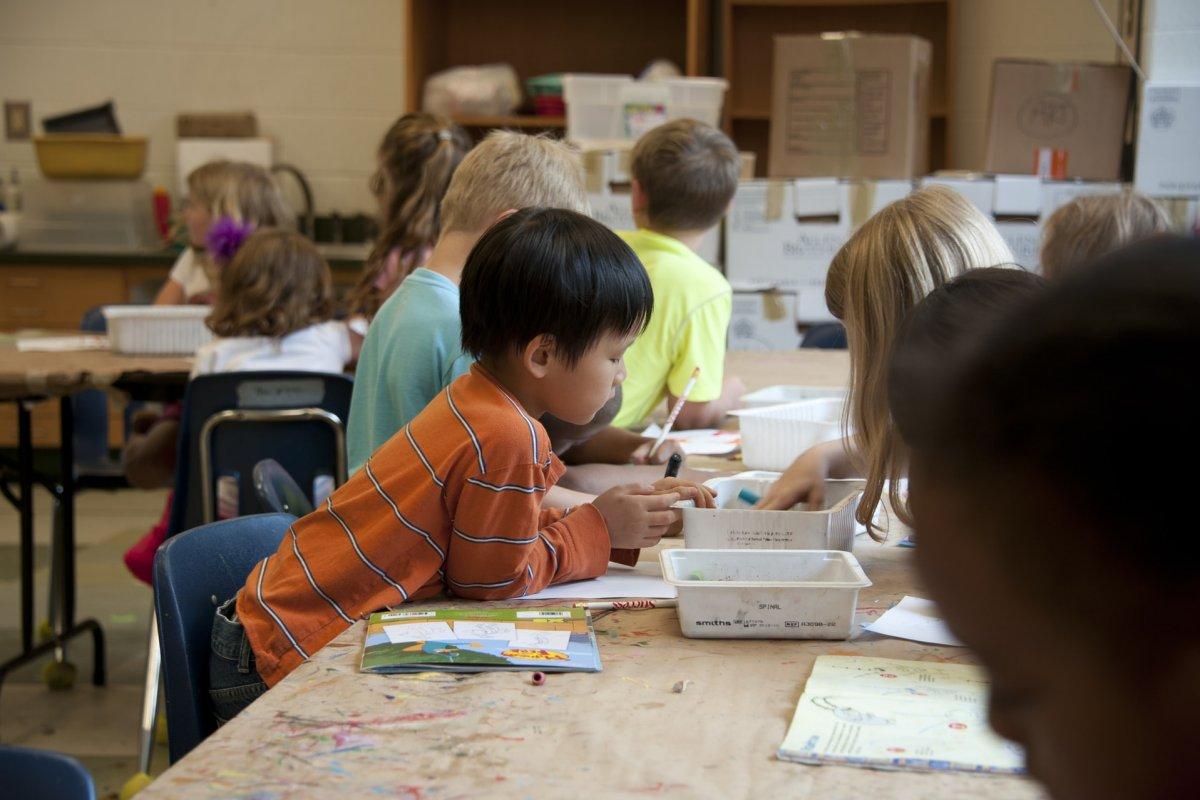
2. It can be tedious to relocate to the Netherlands
If you have a family, and you want to live in the Netherlands, think about education.
While it should be easy for young children, older children who have never spoken Dutch in their lives might have trouble. And even if you choose bilingual primary and secondary schools, Dutch is spoken around 50 percent of the day!
3. There are options for foreign students in the Netherlands
Nevertheless, if you do not plan on staying for very long in the Netherlands, or if you chose to teach English only to your children, there are still international schools that exclusively teach in English.
Another option is choosing some bilingual schools which offer special programs for non-Dutch speakers.
4. There are 3 types of secondary education institutes in the Netherlands
Primary education in the Netherlands lasts 8 years, for children aged 4 to 12.
After that comes secondary education, the equivalent of high school in the Netherlands. Depending on their results as well as the advice from the school, they need to choose between one of the following paths: “voorbereidend middelbaar beroepsonderwijs”, “hoger algemeen voortgezet onderwijs” or “voorbereidend wetenschappelijk onderwijs”.
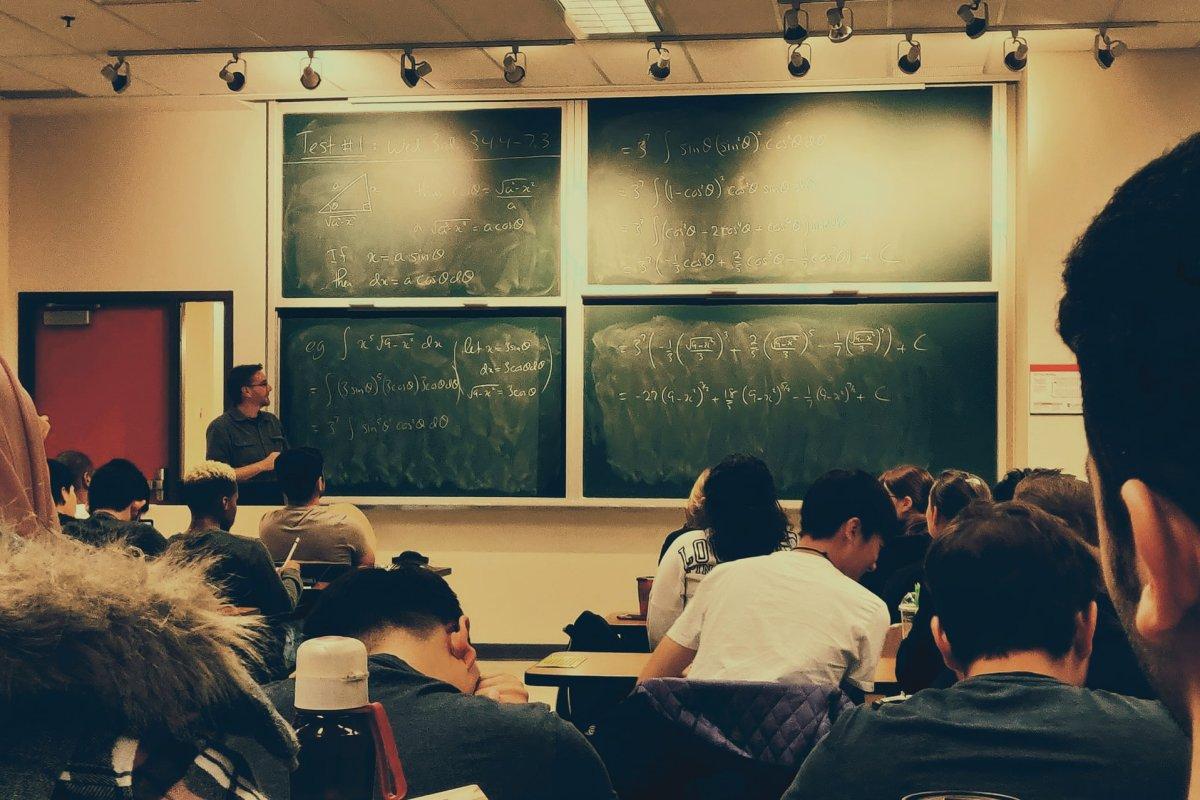
5. The first secondary education institute in the Netherlands is VMBO
“Voorbereidend middelbaar beroepsonderwijs”, often called VMBO, is the first possibility when it comes to secondary education in the Netherlands.
It is pre-vocational secondary education, and it lasts 4 years. It combines both theoretical and academic training. 60 percent of Dutch students choose VMBO.
6. There are four levels in VMBO
Depending on their score, students will be assigned to one of the four education levels in VMBO.
Their acronyms are VMBO-TL (theoretical learning path), VMBO-GL (mixed learning path), VMBO-KBL (middle management-oriented learning path), and VMBO-BBL (baic profession-oriented learning path). There is also full-time practical education for children who would not obtain a VMBO-diploma otherwise.
7. The second secondary education institute in the Netherlands is HAVO
“Hoger algemeen voortgezet onderwijs”, often called HAVO, is the second possibility when it comes to secondary education in the Netherlands.
It is higher general continuing education, and it lasts 5 years. After graduating from HAVO, students can access the HBO level (polytechnic) of tertiary education.

8. HAVO is divided into two phases: general and specialized education
The first three years of HAVO are very general, and are the same for everyone: languages, history, sciences, mathematics, and arts are taught.
Then come the last two years, where students need to choose one of four profiles: culture and society, economy and society, nature and health, or nature and technology.
9. The third secondary education institute in the Netherlands is VWO
“Voorbereidend wetenschappelijk onderwijs”, often called VWO, is the third possibility when it comes to secondary education in the Netherlands.
It is preparatory scientific education, and it lasts 6 years. With a VWO diploma, students can access WO training in universities (though not all of them have the same admission criteria).
10. There are two possibilities in VWO: “atheneum” and “gymnasium”
Atheneum and gymnasium programs are the two possible paths in VWO. The gymnasium program is similar to the other one but adds Latin and Greek as compulsory courses.
Depending on schools, these ancient languages might be taught in the first or the second year, usually starting with Latin.
11. Dutch students do not have many homework to do
In the Netherlands, students can enjoy their free time: there is not that much homework.
They follow what research has shown: play and exercise are vital to children’s school performance. Because of this, Dutch children aged under 10 will receive little to no homework every day, so they can have time for daily exercise. This may be one of the reasons why Netherlands has one of the best education systems in the world!

12. Dutch students usually eat at home instead of at the school cafeteria
While school days last from around 8:30 AM to 3 PM in the Netherlands, students go home for lunch instead of eating at a school cafeteria.
Also, Wednesdays are even more dedicated to out-of-school activities, since schools dismiss students at around noon.
13. Learning a second language is very important in Dutch education
While not many countries put that much emphasis on it, learning a second language is primordial in the Netherlands.
As you know, there are bilingual schools, but generally, all Dutch students learn English, starting very early. There are even schools that require a third language.
14. Education in the Netherlands is affordable compared to Dutch people’s income
Education in the Netherlands is compulsory and free until the age of 16. After that, parents need to pay annual tuition fees for their children’s higher education.
The average cost of said tuition fees is around $2,000 per year, and low-income families can also apply for grants.

15. There are 152 international schools in the Netherlands
English is very important for Dutch people, and this is why so many of them speak it. As a matter of fact, Dutch people are the most proficient English speakers in the world !
To make this possible, they added English very early in their curriculum, but there are also more than 150 international schools in the country that mostly (or only) teach in English.
16. Every child in the Netherlands has access to the regular school in their neighborhood
Education in the Netherlands is very inclusive: even children who require very specific additional support are welcome and will be able to attend regular school, which is responsible for providing a suitable place for these children to learn.
If the support is too intensive, there are also special needs schools.
17. Homeschooling is generally not allowed in the Netherlands
Generally speaking, homeschooling is forbidden in the Netherlands.
Nevertheless, exceptions can be made for families with no school satisfying their religion or life conviction needs in the vicinity. When a child joins this system, it will be very hard for him to go back to regular school though.
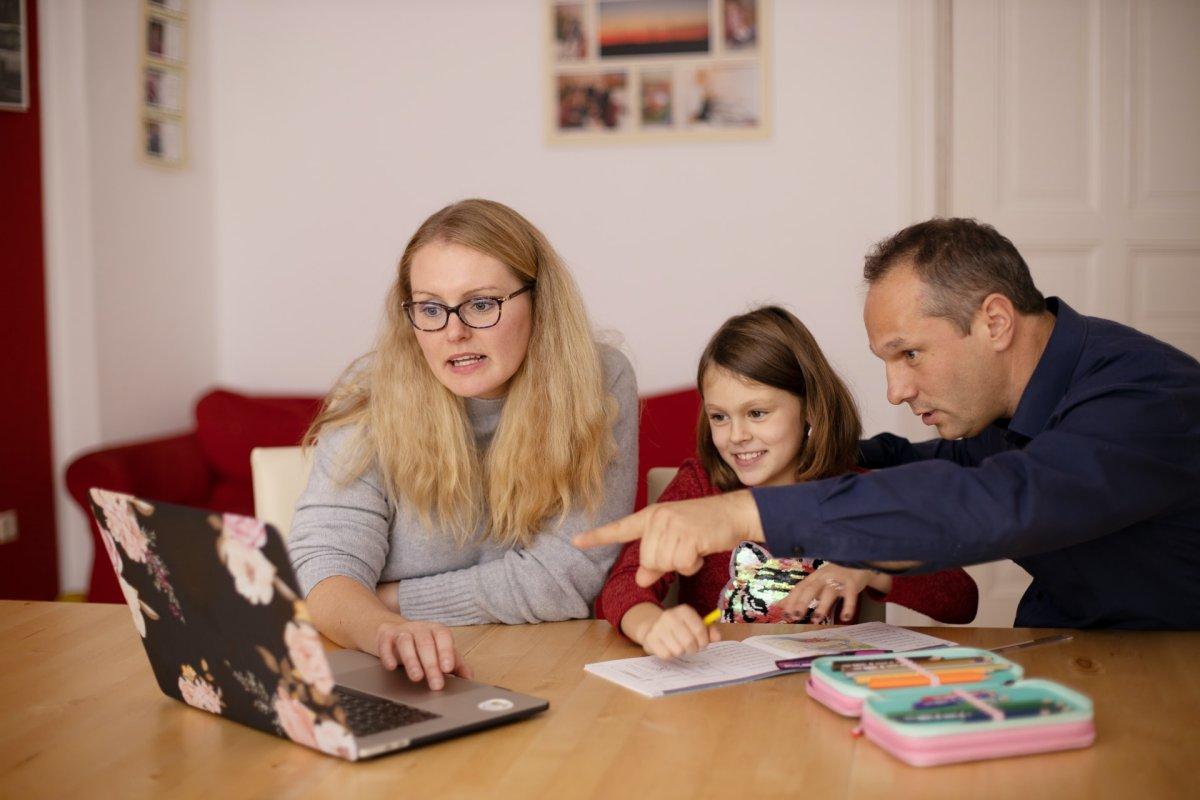
18. There are two types of higher education institutes in the Netherlands
Higher education is divided into two parts in the Netherlands: research-oriented education (WO) and higher professional education (HBO).
The first one is typically offered by research universities, while the second one takes place in universities of applied sciences . They both lead to Bachelor’s or Master’s degrees, but in WO students can also pursue a PhD degree.
19. The Netherlands use a credit system for their education
In order for education to be on equal footing in Europe, many countries use the European Credit Transfer and Accumulation System, better known as ECTS. This enables anyone to move to another country, or temporarily study abroad.
These credits represent 28 hours of study each, and a year is worth 60 credits.
20. There are examinations as early as primary school in the Netherlands
At the end of primary school, children need to pass their first examination. Each school decides which of the government-approved tests they choose, but all students in one school take the same type of test.
There is also an examination at the end of secondary education.
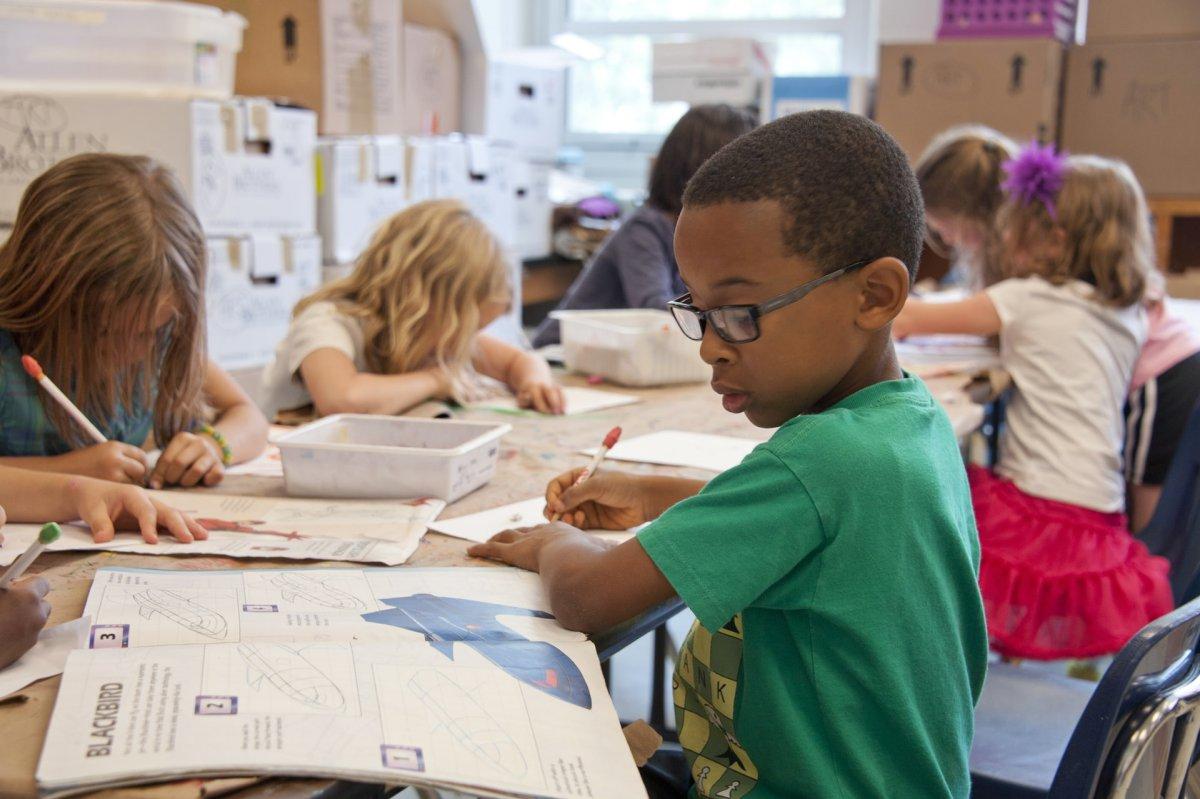
So there you have them, these were all my 20 interesting facts about the Netherlands school system. I hope you enjoyed them and that you learned something new today.
In case you want to learn more about the rest of the country, feel free to keep reading, as I still have lots of things to tell you about:
Let’s keep going with our next part, dedicated to Dutch school hours. The typical school schedule in one country can often be very different from your own, and it’s always interesting to have more details on how students go on about their day.
The Netherlands Primary School Schedule
Mandatory education in the Netherlands starts with primary school, for children aged 5 (though some schools accept 4-year-old kids).
Between the ages of 4 and 12, Dutch children attend primary school. The first 2 years are dedicated to basic skills, before shifting to a more academic path starting in group 3 (primary education ranges from group 1 to group 8, similar to grades).
At the end of group 8, almost every school administers the “ Cito test ”, an aptitude test. It is not mandatory though.
Usually, school starts between 8:30 AM and 8:45 AM before ending between 3 PM and 3:15 PM. The school year typically runs from August or September to June or July.
Dutch High School Schedule
After primary school comes secondary education in the Netherlands.
Dutch children immediately enter high school at the age of 12: depending on their Cito results and the advice of the school, they will choose one of the three possible tracks (“pre-vocational secondary education”, “higher general continued education” or “preparatory scientific education”).
High school lasts 6 years.
This last part is dedicated to general facts about the Dutch education system. More specifically, we’ll check 2 key figures that will give you a better understanding of the Netherlands education level.
Enrollment in tertiary education for The Netherlands: 78.5%
(Average for regions: Sub-Saharan Africa: 8.6% | South Asia: 20.8% | Arab States: 36.4% | East Asia: 36.5% | Latin America: 43.3% | Europe and Central Asia: 62% | North America: 84%)
Data from World Bank EdStats/UNESCO
The Netherlands literacy rate: 99%
(Average for regions: Sub-Saharan Africa: 65.3% | South Asia: 72.9% | Arab States: 79.4% | Latin America: 93.7% | East Asia: 95.8% | Europe and Central Asia: 98.5%)
Do you want even more education facts about other countries?
Check out these facts:
- Education in Germany
- Education in Poland
- Education in Ireland
Or click here to see ALL the education facts up on the blog!
- There are bilingual primary schools in the Netherlands
- It can be tedious to relocate to the Netherlands
- There are options for foreign students in the Netherlands
- There are 3 types of secondary education institutes in the Netherlands
- The first secondary education institute in the Netherlands is VMBO
- There are four levels in VMBO
- The second secondary education institute in the Netherlands is HAVO
- HAVO is divided into two phases: general and specialized education
- The third secondary education institute in the Netherlands is VWO
- There are two possibilities in VWO: “atheneum” and “gymnasium”
- Dutch students do not have many homework to do
- Dutch students usually eat at home instead of at the school cafeteria
- Learning a second language is very important in Dutch education
- Education in the Netherlands is affordable compared to Dutch people’s income
- There are 152 international schools in the Netherlands
- Every child in the Netherlands has access to the regular school in their neighborhood
- Homeschooling is generally not allowed in the Netherlands
- There are two types of higher education institutes in the Netherlands
- The Netherlands use a credit system for their education
- There are examinations as early as primary school in the Netherlands
Share the knowledge! Click on the buttons below to share these Dutch school facts with your friends, and help them learn more about the world 🙂
Hey, I'm Kevin

I'm a professional photographer, with over a decade of experience in the travel industry. I worked with countless travel brands, and my travel advice has been featured in major publications such as CNN, Forbes & the New York Magazine. But the best travel advice is definitely found here on my website! I'm all about adventure travel, hiking and exploring the outdoors - even if I often find myself exploring cities with my wife Nesrine. If you have any questions, leave a comment on this post or reach out by email at: [email protected]
Come say hi on social!
Countries I've visited
Recommended Reading
![homework in the netherlands 25 Interesting Singapore Education Facts [100% true]](https://www.kevmrc.com/wp-content/uploads/2022/05/25-singapore-education-facts.jpg)
Leave a Reply Cancel reply
Your email address will not be published. Required fields are marked *
Notify me when new comments are added.
- International
- Politics & Society
- Photo Report
- Relationships
- Learn Dutch
- Attractions
- Restaurants
- Scheveningen
- International Travel
- Bank for Internationals
- Dutch Language School
- International School
- Recruitment Agency
- Relocation Service
- Real Estate Agencies
- Tax Accountant
- Mortgage Advisor
- Psychologist
- DutchReview Team
- Privacy Policy
- Take Down and Notice
- Advertise with DutchReview
- Submit an article
- Editorial Internships
🚀 New feature alert! Find the best businesses for internationals on DutchReview's Business Directory
9 Things you Need to Know about starting Primary School in the Netherlands
Is your little one about to start primary school in the Netherlands? Or as it’s called out here the ‘Basisschool’. If you’ve just moved here with your soon to be 4 year old and are wondering how to navigate the early year’s education system in Holland or are just curious at how primary school compares to the UK then look no further. Here is a list of 9 things you need to know about starting primary school in the Netherlands.
#1 Primary school in the Netherlands: Kids start school the day after they turn 4
This is perhaps the biggest difference to the UK education system. There is no single intake date. As soon as your child turns 4 they are welcome to join Group 1 (the first year of primary school). However it must be noted that school is not verplicht compulsory until the child turns 5. And most schools allow you to be flexible with the school hours if you think that your child is finding it too much. Also holidays from Dutch schools can be taken during term time without issue as they are not legally required to be at school.
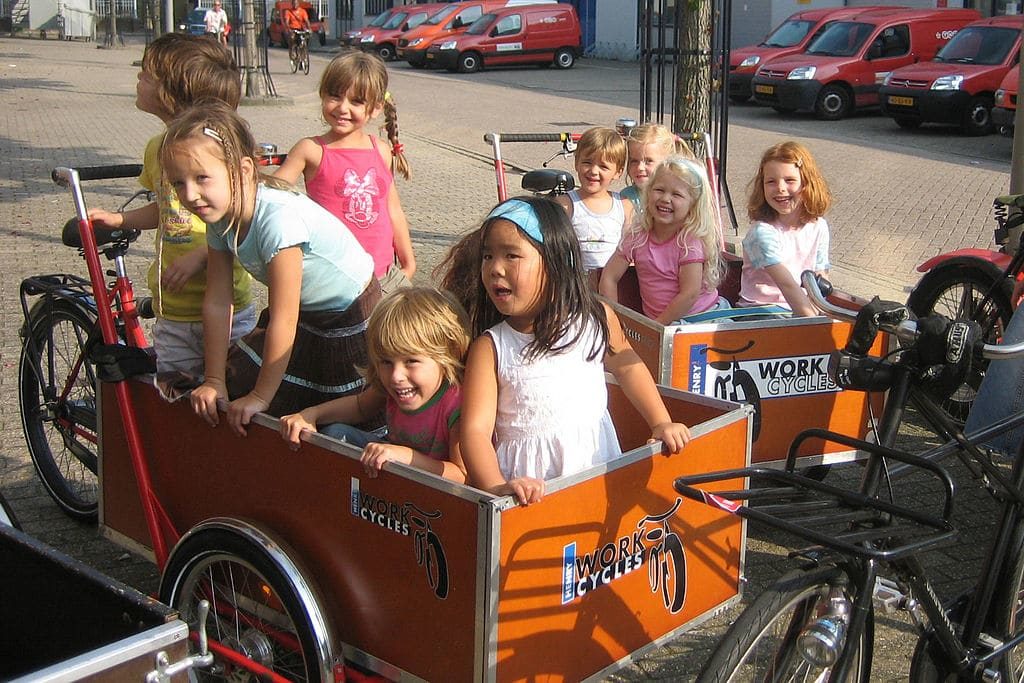
#2 Primary school in Holland: It’s not full time
This was a strange one for me to get my head around. Having experienced primary school myself in the UK where I was expected at school for 9am and was picked up by my parents at 3:15, Monday to Friday. In the Netherlands, most primary schools can pick their own hours which follow a similar pattern. There are 3 full days (Monday, Tuesday, Thursday) and two half days (Wednesday and Friday). Some primary schools, however, extend the half days to three-quarter days as the child progresses up the year groups. So instead of finishing at 12:30, your child would then finish at 2pm.
I actually struggle with this timetable as Wednesday and Fridays just feel like really long days with the boys finishing at 12:30. Having said that though, almost everybody plays a sport outside of school. Therefore the two half-day afternoons are normally taken up with swimming lessons and football/tennis training.
It means that it’s a lot easier to plan a weekend away with the schools finishing so early. It also gives the kids a break, because being in school full time so young must be absolutely exhausting (many adults struggle with a Monday to Friday 9-5 routine and that’s only two hours more than what is expected from a 5-year-old).
#3 Primary school in the Netherlands: They come home for lunch
And if having two half days off a week isn’t enough to recharge the batteries, then coming home every day for lunch certainly will! Yes, you heard that right, the kids come home for lunch – for an hour! We live walking distance to the school so it’s not actually a hardship to walk back and forth 4 times a day. But it does mean that your days at home are actually really short. I actually had to give up ironing as by the time I got the ironing board out and started on the pile I had to be back at school again to pick up the boys (to be honest I’ve never done it but this sounds like a great excuse to use ?).
For the parents that work there is always a TSO, a 3rd party organization that comes into the school and supervises the lunch hour. There is no canteen and so packed lunches are needed. This isn’t free though, ours costs 2.50 euros. I have been known on occasions to ship the kids off with a packed lunch to school just so I can GET SHIT DONE.
#4 Primary school in Holland: There are no lunchbox police
#5 primary school in the netherlands: kids wear mufti everyday.
There is NO school uniform. No last minute rush on the 31st of August looking for a white shirt and trousers that actually fit. No panic washing on Sunday night. No labeling! Just normal clothes. The exact same clothes that my boys wear on the weekend. The biggest downside is the amount of jeans and trainers that we go through. I don’t think my boys own a pair of trousers without a hole in the knee.
When I tell my Dutch friends about school uniforms they find it hilarious. It’s a concept that they just can’t get their heads around, forcing everyone to look the same. I was always brought up to see that as the advantage of uniform, no one would be singled out for wearing the wrong thing. But what I’ve noticed in the Netherlands is that the whole idea of not fitting in isn’t a thing. The Dutch have a saying ‘ Doe maar normaal dan doe je al gek genoeg’ which translates to just be yourself because that’s crazy enough.

#6 Primary school in Holland: The first two years are just play based
Probably very similar to a UK pre-school rather than the first two years of a primary school, Group 1 and Group 2 are just about learning through play. They start to learn the alphabet in Group 2 (equivalent to year 1) but will only learn about half of the letters. The ‘real’ learning begins in Group 3, in which they will finish learning the alphabet and then start to put together letters into words.
The most important part of the early years education is social development. When you get the school report at the end of the year there is a whole page on the social and emotional development of your child (the report itself is 2 pages so you can see how important this is!).

#7 Primary school in the Netherlands: Repeating a year is NOT a big deal
I don’t ever seem to remember anybody at my primary school in the Netherlands repeating a year, nor being moved up for that matter. If a child was struggling then they received extra work. And if a child was doing really well, then they also received extra work.
In Holland, it works a little differently. If your child is finding the work a bit too challenging or isn’t quite ready to sit still and concentrate for a period of time, then it will be suggested that he or she blijft zitten- stays sitting. Not repeating the year, or being moved down a year group. Just stays where they are for another year. And because of the way the Dutch intake work there is normally a variety of ages in one year group, meaning that the groups are based on ability rather than age. Every year since my boys have started school, they have had two or three classmates who ‘stayed sitting’ and have had a few new ones that have joined. And it’s absolutely not a big deal. It’s actually a relief. Knowing that your child is at a level where they no longer have to struggle means that their confidence rockets. Definitely an advantage of the Dutch school system.
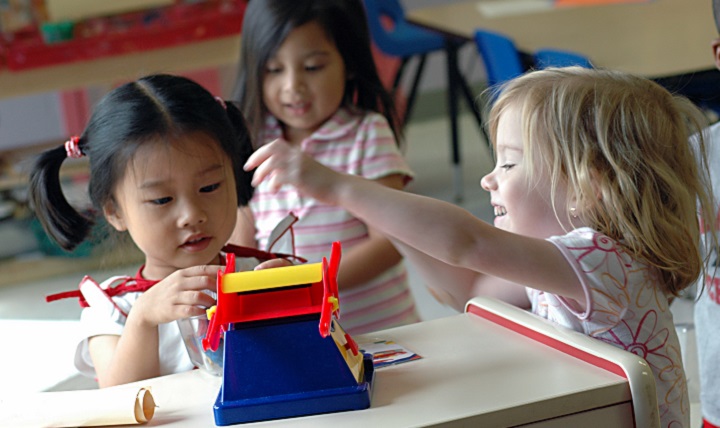
#8 Primary school in Holland: Kids cycle to and from school alone!
Ok, so it’s not expected that your 4 years old will cycle to and from school all by themselves. But from about Group 5 (year 4) it’s not unusual to see kids arriving at school on their bikes unaccompanied. They park them up in the designated bike racks, lock them and deposit the key in a special tub in the classroom.
All Dutch kids receive bike lessons at school from about 6 years old and more importantly they learn the rules of the road.

Because of all the designated cycle paths, biking to school is incredibly safe. So safe in fact almost no one wears a helmet. I can hear your gasps now but cycling to Dutch people is just like walking to us. In fact, from about 9 years old Dutch kids go to school trips on their bikes, cycling as a whole class, with fluorescent yellow vests but no head protection!
My daughter, who was born in the Netherlands, learned to walk at 1 and ride a bike without stabilizers at 2 so I can see where the confidence comes from. Kids are cycling almost as long as they have been walking.
#9 Primary school in the Netherlands: There is NO homework
Perhaps my most favorite thing about Dutch education is the kids having no homework. When we first moved here I remember chatting with the headteacher about my son starting. When I asked how much homework to expect she looked at me with a shocked expression and said “Homework?! There’s no homework, when he gets home from school we expect him to go out and play!”
There is not even any compulsory reading!! Of course, I still read to my kids every night but the fact that we don’t HAVE to makes it feel a lot less like a chore.
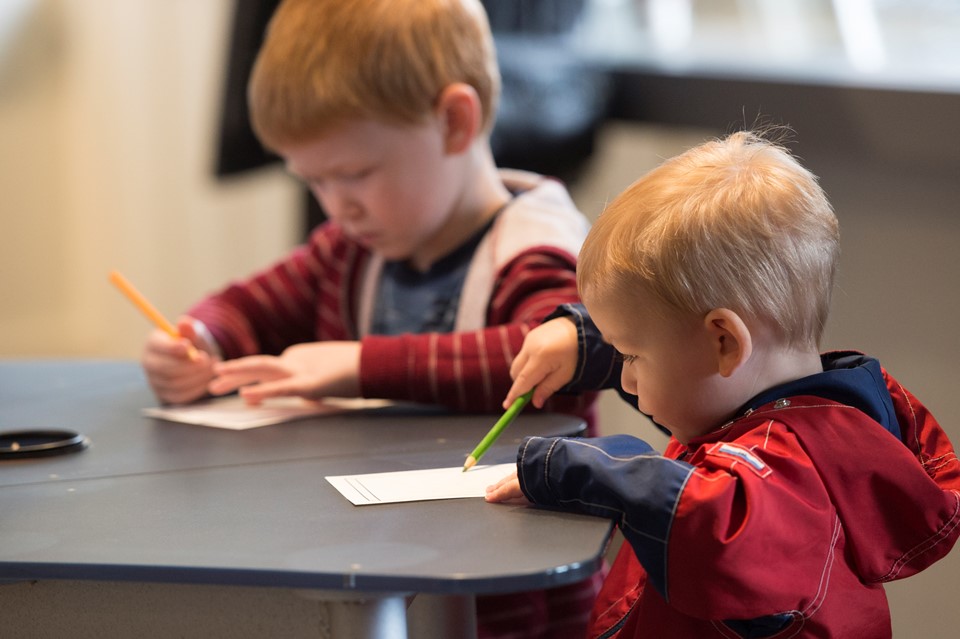
My son is now in Group 5 (Year 4) and the most ‘homework’ we have had throughout his time at school, has been to prepare a book report. Though I have heard the rumors that we may be expecting proper homework this year but so far nothing!
This “no homework” policy gives kids unbelievable freedom when they get home from school. They can go straight out to play (no need to get changed as they’re in school uniform remember) and just be kids. No responsibility, no deadlines, no worrying that because mummy isn’t so good at maths they won’t be able to complete their work!!
They are children for such a short period of time and the Dutch seem to have realized that and are happy just to let kids be kids for that little bit longer, a sentiment I wholeheartedly agree with.
So these are the 9 things you need to know about starting primary school in the Netherlands. Is there anything we missed out on? Let us know in the comments below!

The Gif of the boy abusing the other kid on the soccer field is truly triggering since bullying is a real problem in Dutch schools! Also, don’t expect them to do much about it but instead call it “directness” even if your child is being tortured daily!
Oh gosh that’s terrifying to hear about the bullying. What options did you feel you had? Any meetings with administrators? Switch schools?
okay… my english is not so very good, but I can try it! you may know, on my Dutch primary school I learned Dutch in the second class (groep 2) now I’m in the first class of secundary school. its really fun! but I can say: on my school in the Netherlands, nobody go to home on lunchtime! why? there are pupils, they go by schoolbus and live 30 kilometres from school. I was one of them. and it costs nothing! I wanted to clarify that. thanks for reading!
Beautifull written and correct. And for reacting on the bullying, yes bullying is there but any school with or without uniform has this. The school and sportclubs have policies for bullying and there are special cursus schools can give in classes and for the special kid who is being bullyed. Like ‘Rots en water training”. And Judo or other specifiek sports can give the child tools, so that support ables the kid to react on the bullyers and defend him self, better now then when your older.
LEAVE A REPLY Cancel reply
Save my name, email, and website in this browser for the next time I comment.
This site uses Akismet to reduce spam. Learn how your comment data is processed .
Related posts
The 8 greatest forests in the netherlands for a nature escape, latest posts, best beaches in the netherlands: the ultimate guide to dutch beaches, a guide to 13 thrilling zoos and animal parks in the netherlands, it's happening, upcoming events, ‘in brilliant light’: marvel at contemporary african art at this exciting new exhibit, this virtual open day will let you tour one of rotterdam’s top international schools, whit sunday (eerste pinksterdag), stand out from the crowd with this personal branding workshop at nyenrode, come closer explore interactive art from around the world in antwerp, father’s day, june solstice, 3rd oktober (festival in leiden), daylight savings time ends, the latest dutch news. in your inbox., woah, you look pretty good here.
We're constantly hunting for the latest, greatest, and most Dutch spots for our readers. Want your business to reach an unrivalled expat and international audience?

We like you - a lot
© 2023 All Rights Reserved. All material on this website (DutchReview) is strictly copyright and all rights reserved. If you are dissatisfied with the website or any content or materials on it, your sole exclusive remedy is to discontinue your use of the website. The website may provide links to other websites on the Internet, the content of which is not in our control. Whilst every effort has been made to ensure accuracy, the publisher cannot accept responsibility for omissions and errors. If you have found material on this website which is copyrighted by others, please contact the webmaster on this matter in order to have it removed.
Homework could have an impact on kids’ health. Should schools ban it?
Professor of Education, Penn State
Disclosure statement
Gerald K. LeTendre has received funding from the National Science Foundation and the Spencer Foundation.
Penn State provides funding as a founding partner of The Conversation US.
View all partners

Reformers in the Progressive Era (from the 1890s to 1920s) depicted homework as a “sin” that deprived children of their playtime . Many critics voice similar concerns today.
Yet there are many parents who feel that from early on, children need to do homework if they are to succeed in an increasingly competitive academic culture. School administrators and policy makers have also weighed in, proposing various policies on homework .
So, does homework help or hinder kids?
For the last 10 years, my colleagues and I have been investigating international patterns in homework using databases like the Trends in Mathematics and Science Study (TIMSS) . If we step back from the heated debates about homework and look at how homework is used around the world, we find the highest homework loads are associated with countries that have lower incomes and higher social inequality.
Does homework result in academic success?
Let’s first look at the global trends on homework.
Undoubtedly, homework is a global phenomenon ; students from all 59 countries that participated in the 2007 Trends in Math and Science Study (TIMSS) reported getting homework. Worldwide, only less than 7% of fourth graders said they did no homework.
TIMSS is one of the few data sets that allow us to compare many nations on how much homework is given (and done). And the data show extreme variation.
For example, in some nations, like Algeria, Kuwait and Morocco, more than one in five fourth graders reported high levels of homework. In Japan, less than 3% of students indicated they did more than four hours of homework on a normal school night.
TIMSS data can also help to dispel some common stereotypes. For instance, in East Asia, Hong Kong, Taiwan and Japan – countries that had the top rankings on TIMSS average math achievement – reported rates of heavy homework that were below the international mean.
In the Netherlands, nearly one out of five fourth graders reported doing no homework on an average school night, even though Dutch fourth graders put their country in the top 10 in terms of average math scores in 2007.
Going by TIMSS data, the US is neither “ A Nation at Rest” as some have claimed, nor a nation straining under excessive homework load . Fourth and eighth grade US students fall in the middle of the 59 countries in the TIMSS data set, although only 12% of US fourth graders reported high math homework loads compared to an international average of 21%.
So, is homework related to high academic success?
At a national level, the answer is clearly no. Worldwide, homework is not associated with high national levels of academic achievement .
But, the TIMSS can’t be used to determine if homework is actually helping or hurting academic performance overall , it can help us see how much homework students are doing, and what conditions are associated with higher national levels of homework.
We have typically found that the highest homework loads are associated with countries that have lower incomes and higher levels of social inequality – not hallmarks that most countries would want to emulate.
Impact of homework on kids
TIMSS data also show us how even elementary school kids are being burdened with large amounts of homework.
Almost 10% of fourth graders worldwide (one in 10 children) reported spending multiple hours on homework each night. Globally, one in five fourth graders report 30 minutes or more of homework in math three to four times a week.
These reports of large homework loads should worry parents, teachers and policymakers alike.
Empirical studies have linked excessive homework to sleep disruption , indicating a negative relationship between the amount of homework, perceived stress and physical health.

What constitutes excessive amounts of homework varies by age, and may also be affected by cultural or family expectations. Young adolescents in middle school, or teenagers in high school, can study for longer duration than elementary school children.
But for elementary school students, even 30 minutes of homework a night, if combined with other sources of academic stress, can have a negative impact . Researchers in China have linked homework of two or more hours per night with sleep disruption .
Even though some cultures may normalize long periods of studying for elementary age children, there is no evidence to support that this level of homework has clear academic benefits . Also, when parents and children conflict over homework, and strong negative emotions are created, homework can actually have a negative association with academic achievement.
Should there be “no homework” policies?
Administrators and policymakers have not been reluctant to wade into the debates on homework and to formulate policies . France’s president, Francois Hollande, even proposed that homework be banned because it may have inegaliatarian effects.
However, “zero-tolerance” homework policies for schools, or nations, are likely to create as many problems as they solve because of the wide variation of homework effects. Contrary to what Hollande said, research suggests that homework is not a likely source of social class differences in academic achievement .
Homework, in fact, is an important component of education for students in the middle and upper grades of schooling.
Policymakers and researchers should look more closely at the connection between poverty, inequality and higher levels of homework. Rather than seeing homework as a “solution,” policymakers should question what facets of their educational system might impel students, teachers and parents to increase homework loads.
At the classroom level, in setting homework, teachers need to communicate with their peers and with parents to assure that the homework assigned overall for a grade is not burdensome, and that it is indeed having a positive effect.
Perhaps, teachers can opt for a more individualized approach to homework. If teachers are careful in selecting their assignments – weighing the student’s age, family situation and need for skill development – then homework can be tailored in ways that improve the chance of maximum positive impact for any given student.
I strongly suspect that when teachers face conditions such as pressure to meet arbitrary achievement goals, lack of planning time or little autonomy over curriculum, homework becomes an easy option to make up what could not be covered in class.
Whatever the reason, the fact is a significant percentage of elementary school children around the world are struggling with large homework loads. That alone could have long-term negative consequences for their academic success.
- Trends in Mathematics and Science Study (TIMSS)
- Elementary school
- Academic success

Research Fellow

Senior Research Fellow - Women's Health Services

Lecturer / Senior Lecturer - Marketing

Assistant Editor - 1 year cadetship

Executive Dean, Faculty of Health
- Dual careers
- Volunteering
- ACCESS Features
- ACCESS Magazine
- Counselling
- Childbirth Courses
- First Aid Courses
- Testimonials
- Disclaimer and privacy policy
- ACCESS Partners
- ACCESS Counsellors
- ACCESS Trainers
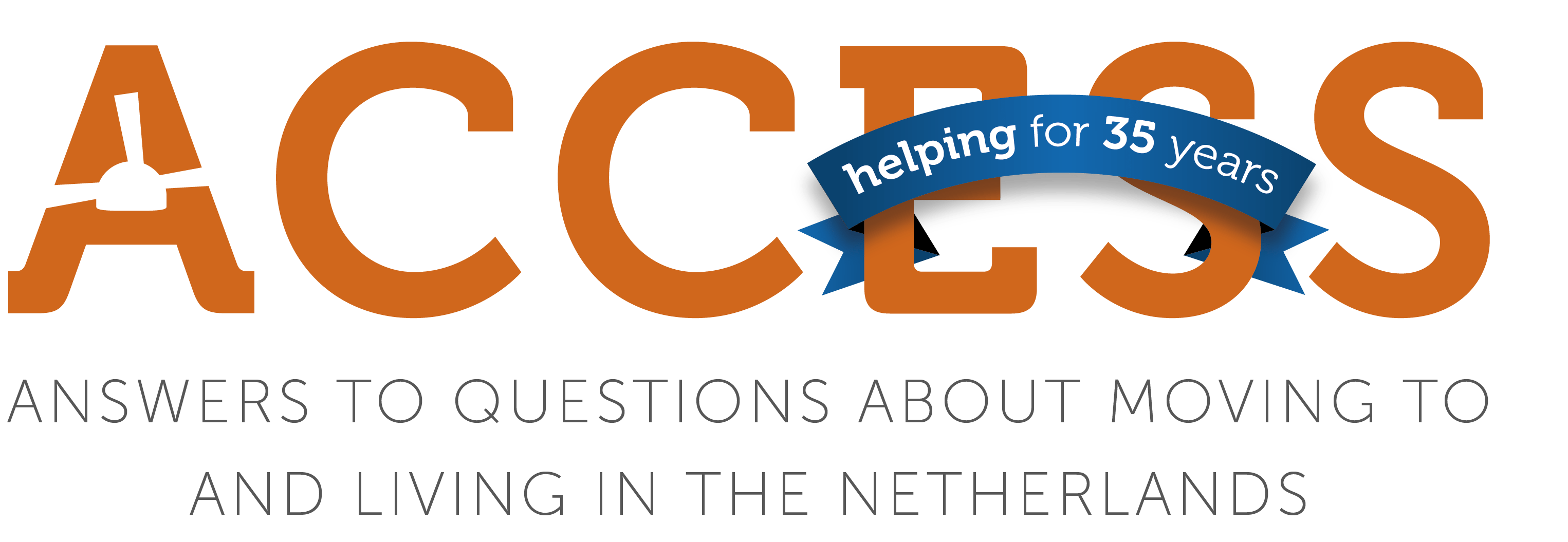
Helpdesk + 31(0)85 4000 338 helpdesk[at]access-nl.org
Visit us in:
The Hague - Amsterdam
Amstelveen - Utrecht
ACCESS NL > Education in the Netherlands > Dutch school system > Primary and secondary education > I am moving to the Netherlands soon. I am considering home schooling for my children. Is this allowed in the Netherlands?
Primary and secondary education
I am planning to stay here for a long time. Should I send my children to a Dutch or an international school?
If you are planning to stay here for a long time, a Dutch school could be an option, depending on the age of your children. If your children have previously attended a school in another country and are used to lessons in English, or if you anticipate that your children will return to another country’s educational system in the future, it might be in the best interests of your children to go to a Dutch international school (subsidised by the Dutch government) or an international school here in the Netherlands.
However, if your child is at the beginning of primary school, a Dutch school might be an option. Some of them offer special courses to learn Dutch for newly-arrived foreign children ages 6-11 at the opvangscholen (reception schools). These are ordinary basisscholen (primary schools) with a special class for learning Dutch: the reception group. Every week they are taught to speak, comprehend, read and write Dutch by someone who is experienced in teaching foreign children. When children are not attending lessons in the special reception group, they attend regular classes at the school for subjects such as math, history, science, arts and crafts, etc. You can find such a primary school on https://www.lowan.nl/po/scholen/ (Dutch only). Keep in mind that if you are looking for a school in The Hague to search for “Den Haag” (in Dutch).
Children from 12 years of age are usually required to attend Internationale Schakelklas – ISK (bridging schools). Children will usually be assessed for their linguistic skills in the Dutch language before they are allowed to enrol in an ISK school. Depending on their age and ability in mastering the Dutch language, children will typically spend between 1.5 to 2 years attending an ISK school before transferring to the mainstream Dutch educational system. You can find such a secondary school on https://www.lowan.nl/vo/scholen/ (Dutch only). Keep in mind that if you are looking for a school in The Hague to search for “Den Haag” (in Dutch).
The following website https://utesinternationallounge.com/dutch-education-explained-by-genoveva-geppaart/ provides you with an overview of Dutch education.
I have a 14 year old daughter who is coming to live with me in the Netherlands. She does not speak any Dutch. Therefore, can you recommend a Dutch state school where my daughter can learn the language as well as being taught the normal academic subjects?
From 12 years of age, Dutch children normally choose from more vocationally-based training to pre-university diplomas depending on their academic ability. The lessons are given in Dutch.
After registering with the municipality in which they live, those children who meet the following criteria are usually required to attend ‘bridging’ schools known as Internationale Schakelklas – ISK:
- Have lived in the Netherlands for less than two years
- Need tuition to become competent in speaking the Dutch language
- Are between the ages of 12 and 18
Children will be assessed for their linguistic skills in the Dutch language before they are allowed to enrol in an ISK school. There are ISK schools located throughout the Netherlands. There is no list of ISK’s . Best is to check with your municipality.
The ISK schools prepare pupils for intake into secondary education or vocational education, depending on the age of the students. These schools teach children as much Dutch as possible, so that the children can learn to the same level of academic ability in the Netherlands as they would in their home country. At the ISK schools the teenage children will be given dedicated lessons to learn Dutch for approximately 16 to 20 hours per week.
In addition to the teaching of other academic subjects such as mathematics, geography, history and economics, art and culture, the ISK schools also provide additional support for the students. This support is often in the form of a dedicated mentor and access to other specialised services, for example a speech therapist for those children who experience difficulty in pronunciation of the Dutch language.
Depending on their age and ability in mastering the Dutch language, children will typically spend between 0.5 to 3 years attending an ISK school before transferring to the mainstream Dutch educational system.
Do all international schools teach in English?
In general, most international schools teach in English, but there are also schools that teach children in their native language, e.g. the German, French, Indonesian, Japanese and Korean schools.
What are the principle aims of Dutch primary school education and what subjects will my child be taught?
The Dutch government has set kerndoelen (attainment targets) which define what children are expected to have acquired in the way of knowledge, understanding and skills by the end of primary school. Whilst these attainment targets describe in general terms the skills and knowledge a child must have acquired, the referentieniveaus (benchmark levels) for mathematics and language specifically prescribe the degree of proficiency that a child must attain in any given year of schooling.
The core curriculum for all basisscholen (primary schools) must include the following subjects:
- English (from group 7 on- 10/11 years years old)
- Arithmetic and mathematics
- Social and environmental studies (including, for instance, geography, history, science – including biology, citizenship, social and life skills – including road safety, healthy living, social structures – including political studies, and religious and ideological movements)
- Creative expression (including, for instance, music, drawing and handicrafts)
- Sports and movement.
Schools are free to offer other subjects such as French, German or religious studies, but these subjects are not required by law.
I want to raise my children bilingually. Are there any Dutch schools that teach (partly) in English?
There are an increasing number of schools providing bilingual lessons. Most of them are secondary schools. In the Netherlands, Tweetalig Onderwijs – TTO (bilingual education) came into existence in 1989. In most cases, TTO refers to bilingual (mostly English-Dutch) and V oorbereidend Wetenschappelijk Onderwijs – VWO, where this is the pre-university stream in Dutch secondary education.
In the TTO schools, a wide variety of subjects such as history, geography, math, physics, biology, chemistry, economics, IT, arts and music are taught in English. Bilingual lessons are taught over the preceding six years leading up to university entrance. Whilst in the last three years, students will focus upon the academic subjects that they will be examined on (in Dutch), some of the lessons will still be provided in English. Bilingual students also have the opportunity to sit the internationally recognised International Baccalaureate (IB) English Certificate. A successful result qualifies these students to enrol at English-speaking universities.
The aim of bilingual education is to prepare students for an increasingly global environment. Hence, whilst foreign language skills are important, the lessons are taught in a broad, internationally oriented context.
It should be noted that the Dutch bilingual school system has been set up with the emphasis upon native speaking Dutch children becoming competent in speaking English as their second language rather than vice versa.
What are the options for my child’s secondary and higher education options in Dutch schools and universities?
During the final year of primary school (normally in April/May), Dutch children take a mandatory test. The aim of this test is to assess the extent to which a child has progressed in his or her proficiency of the Dutch language and in mathematics. The results of the test, together with the teacher’s assessment over the preceding years, will determine which type of secondary education would be most appropriate for the pupil. The secondary and higher education options are:
- VMBO: practical secondary education
- HAVO: senior general secondary education (entrance to HBO – university of applied science)
- VWO: university preparatory education (entrance to hbo – university of applied science or wo – research university)
VMBO (preparatory secondary vocational education)
The VMBO ( voorbereidend middelbaar beroepsonderwijs ) prepares its students for a more vocationally based secondary education at a MBO ( middelbaar beroepsonderwijs ) senior school or, in some cases, a more general secondary education at a HAVO ( hoger algemeen voortgezet onderwijs ) senior school. A pupil will spend four years in VMBO education and whilst in their second year choose their preferred vocational direction. At the MBO they will be taught subjects that will prepare them for various occupations ranging from shop manager to mechanic or nursing assistant. Pupils who successfully complete the theoretical, combined or middle-management vocational programme at the VMBO level can enrol in professional and middle-management training. Holders of a middle-management MBO certificate may go on to study at the HBO level (higher professional education).
HAVO (senior general secondary education)
A HAVO ( hoger algemeen voortgezet onderwijs ) education takes five years and prepares students for a professional education ( hoger beroepsonderwijs – HBO).
VWO (pre-university education)
A VWO ( voorbereidend wetenschappelijk onderwijs ) education takes six years and prepares students for a research university education . In the first two years, students follow a common curriculum. All students at a VWO school must study three languages (French, German and English) up to the end of their third year. At the end of the third year, the students choose an academic ‘profile’ package, which includes both compulsory and optional subjects.
Find more information about foreign education systems and international baccalaureate as well as overviews of foreign diplomas in comparison with Dutch diplomas on: www.nuffic.nl .
In the Netherlands, all children aged 5-18 are required to attend school. Hence, ‘home schooling’ is not allowed. There are, however, a few situations in which an exception can be made. If you have objections to the view of life (e.g. religion) of every school in your area, you need to give a declaration to your municipality about this. You can contact your municipality for more information about the content of the declaration.
If your child is physically and/or mentally unable to attend school, you need permission for home schooling from your municipality.
Nederlandse Vereniging voor Thuisonderwijs – NVvTO is the Netherlands home schooling association. It is an organisation of parents (and other adults who function as such) who wish to home school their children whilst in the Netherlands and have done so in the past, or plan to do so in the future. More information regarding this can be found on Thuisonderwijs.nl/english.
Who is the leerplichtambtenaar and why did I get a letter from this person?
The leerplichtambtenaar is an official in charge of checking that the rules regarding leerplichtwet (compulsory educational law) are followed.
According to Dutch law, schools are responsible for monitoring and controlling all absences of their children from school. They are legally required to inform the leerplichtambtenaar (official in charge) when any child misses more than sixteen hours of school over a period of four weeks. The school may also inform the leerplichtambtenaar if a child has been late twelve times for school.
Once the leerplichtambtenaar has received such information from the school, he/she will contact the parents to determine what action may be taken.
Only in a few specific circumstances can schools grant permission for children to miss school during the school year. Schools may grant permission for a child to be absent from school for events such as weddings, funerals, religious holidays and moving house. For every other absence, it is compulsory for the parent to ask for permission from the head of school in advance.
School attendance records are regularly inspected by a leerplichtambtenaar , who tends to also check for pupil absentees right at the beginning or end of the school term, as they are regarded as very suspicious periods.
How does the Dutch school system work?
Dutch education is , like in many other countries, divided into primary education, secondary education and tertiary education.
Primary education
In the Netherlands, primary school starts with kindergarten at age four. From age five it is compulsory to attend school fulltime. There are hardly any private schools in the Netherlands. Schools can have a certain religious orientation such as Protestant, Catholic, Islamic, Hindu, any other religion or no religion at all. In addition, schools can follow a certain educational philosophy such as Montessori, Jenaplan, Dalton or Vrije School (internationally also known as Waldorf). Children with special educational needs will find offerings more frequently in primary than in secondary schools.
Secondary education
There are four options for secondary school:
- Practical education ( praktijkonderwijs)
- Preparatory secondary vocational education (voo rbereidend middelbaar beroepsonderwijs , VMBO)
- Senior general secondary education ( hoger algemeen vormend onderwijs , HAVO)
- Pre-university education ( voorbereidend wetenschappelijk onderwijs , VWO)
Tertiary education
After secondary school there are several options:
- Medium level professional education ( middelbaar beroepsonderwijs , MBO) for those who have finished VMBO. Like VMBO this has four levels.
- University of Applied Science ( hoger beroepsonderwijs , HBO) for those who have finished HAVO (or MBO at the highest level)
- Research University ( universiteit ) for those who have finished VWO ( or first year -called propedeuse – at HBO)
You can read more about how the Dutch education system works on the site of Ute Limacher-Riebold
My daughter is in group 8 of a Dutch primary school. She is capable of the HAVO or VWO track in secondary school, but her Dutch is insufficient for this level. What options are available?
If your child is capable of HAVO or VWO but her Dutch level is insufficient, a kopklas can be the solution.This year following group 8 focuses on improving children’s Dutch and enabling them to attend the most appropriate secondary school. Choosing this class requires high motivation by both parents and child, and it is best to discuss this option with your child’s teacher.
Special needs education
View the FAQ’s
After-school activities for kids
Related Partners
Direct Dutch Institute
Nord Anglia International School (NAISR)
Amity International School Amsterdam
The International School of Amsterdam
International School Delft
International Waldorf School The Hague

Do kids have homework in the Netherlands?

Yes, starting from 6th grade (age 9), most Dutch primary schools assign regular homework to their students. Homework is not given daily, but rather once or twice a week. The homework assigned in Dutch primary schools is often designed to be completed independently by the child, without the need for parental assistance.
What do kids learn in the Netherlands?
In the Netherlands, students attend primary school for eight years, from the age of 4 until they are 12. During this time, children acquire basic skills such as reading, writing, and arithmetic. They also begin studying English at around Group 7, although some may start learning English earlier.
How does school work in the Netherlands?
Education in the Netherlands consists of eight years of primary education and four, five, or six years of secondary education, depending on the type of school. After completing secondary school, students have the option to pursue vocational education or higher education.
How long is a school day in the Netherlands?
In primary school, classes typically start between 8:30 and 9:00 in the morning and end around 15:00. There is usually an hour-long lunch break at 12:00. On Wednesdays, children have half days and are dismissed at 12:00. Secondary school students have similar start times, but their school day may end later, around 16:00-17:00, depending on the schedule for that day.
Does the Netherlands allow homeschooling?
Homeschooling is not explicitly recognized by Dutch law in the Netherlands. Compulsory education is monitored by the Municipal Executive Council, which ensures that all school-aged children are attending schools in their respective municipalities.
Are schools free in the Netherlands?
With the exception of some private schools, most Dutch primary and secondary schools are free. Parents are usually required to pay a small contribution, which the schools utilize for extra activities and resources. Some international schools are partly funded by the government, while others operate as private institutions.
What countries are most homeschooled?
Homeschooling is legal in several countries. Some countries with a strong homeschooling movement include Australia, Canada, New Zealand, the United Kingdom, and the United States.
How long is summer break in the Netherlands?
The school year in the Netherlands typically includes three compulsory holiday periods: 2 weeks at Christmas, 1 week in May, and a 6-week break during the summer.
Is school in the Netherlands hard?
Compared to the American education system, the Dutch education system is generally considered to be more relaxed in terms of class assignments but stricter when it comes to grading. It can be challenging to achieve high marks in the Netherlands, and students often receive fewer assignments than their American counterparts.
Do schools in the Netherlands have homework?
In most Dutch primary schools, children start receiving regular homework from 6th grade (age 9) onwards. The frequency of homework is typically once or twice a week, rather than daily. Dutch primary school homework is designed to be completed independently by the child, without the need for parental assistance.
What is a typical school like in the Netherlands?
In the Netherlands, schools often have small class sizes, and there is a strong emphasis on team and project work, as well as fostering innovation and creativity.
What age is grade 1 in the Netherlands?
Children in the Netherlands typically start elementary or primary school at the age of four. The Dutch elementary school system consists of eight grades, known as “groepen.” Groep 1 includes the youngest children (age 4) and Groep 8 are the oldest (age 12).
Is Health Care Free in the Netherlands?
The Netherlands has a universal healthcare system, but all adults living or working in the country are required by law to have basic health insurance. The cost of basic insurance is typically around €100-120 per month. Employers also make a small contribution towards medical coverage for their employees.
Are Dutch kids happier?
Dutch children consistently rank among the happiest in the world according to various studies and surveys. The Dutch parenting style, emphasis on play, and focus on creating a safe and supportive environment contribute to their overall happiness.
Is Netherlands good to raise kids?
The Netherlands is ranked as the 9th best country in the world for raising a family. The country’s educational system, social welfare programs, and safe environment make it an ideal place for raising children.
Is Netherlands kid friendly?
Yes, the Netherlands offers a wide range of activities and attractions for kids. From talking trees and floating pancake houses to safaris that bring children face-to-face with wild animals, there is no shortage of entertainment options for kids in the Netherlands.
What are the disadvantages of living in the Netherlands?
Living in the Netherlands can be costly, as the country has a high cost of living. Expenses such as accommodation, groceries, and services can be relatively expensive. For example, owning a car in the Netherlands can be expensive due to high road tax and repair costs.
How safe is Netherlands for students?
The Netherlands is considered a safe country for students. The crime rate is relatively low, and the country is known to be safe for female travelers. It ranks 16th on the list of world’s safest countries.
Is studying in Netherlands stressful?
Studying in the Netherlands can be challenging due to the high demand for education and housing. Many students report experiencing stress as international students in the country.
What time do kids in the Netherlands get out of school?
In primary school, classes typically end between 15:00 and 15:30. However, the lunch break and dismissal times may vary between schools. On Wednesdays, children have half days and are dismissed at 12:00. Secondary school students usually have similar start and end times, depending on their specific schedule for the day.
Is education in Netherlands good?
The education system in the Netherlands is highly regarded and known for its quality. Dutch universities consistently rank among the top in Europe and globally, making the country an excellent choice for pursuing higher education.
How much vacation do the Dutch get?
Full-time employees in the Netherlands are entitled to a minimum of 20 days (4 weeks) of paid leave per year. The number of vacation days is calculated based on the number of hours worked per week.
Which country gives students the most homework?
Students in Shanghai, China, who consistently score highly on PISA test scores, have been found to do an average of 14 hours of homework per week. Wealthier students in Shanghai may even spend up to 16 hours on homework each week.
Are homeschooled kids successful in life?
Research has shown that homeschooled students often perform better in post-secondary education compared to their peers from conventional schools. Homeschooled students tend to score higher on standardized tests and have higher graduation rates.
Why is homeschooling not allowed in Germany?
In Germany, homeschooling is not allowed due to a preference by the government to promote attendance in traditional schools and avoid the formation of parallel societies. The European Court of Human Rights has also upheld decisions that limit religious freedom within the context of homeschooling.
About The Author
Russell padilla, leave a comment cancel reply.
Your email address will not be published. Required fields are marked *
Save my name, email, and website in this browser for the next time I comment.
Cookie preferences
The school with no classes, no classrooms and no curriculum.
We start with you. What do you want to learn? What are your talents, interests, and ambitions? You can use everything in the world that’s worthwhile to investigate, make or develop as your personal starting point for learning. Your personal coach will support and supervise your learning process. At Agora we traded courses, timetables, classes, and tests for challenges, collaboration and coaching by teachers.
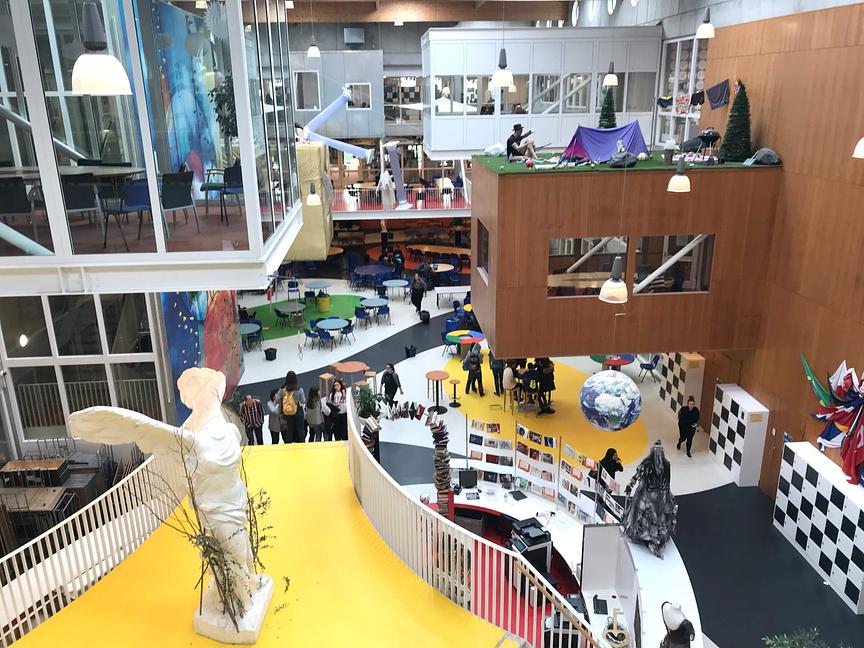
HundrED has selected this innovation to
HundrED 2022
HundrED 2021
HundrED 2020
About the innovation
The basics...
At Agora, we believe that school has to be a good mix between:
Harvard University ... a place where all the knowledge of the world is within reach.
A Buddhist monastery ... where you feel comfortable and at ease andwhere you discover what is valuable to you in life.
A creative laboratory ... where you can make and try everything you can imagine: painting, welding, graphicdesign, 3D printing...from cooking to programming to making a robot: if you canimagine it, you can make it.
A marketplace … where you can see new things, meet and inspire each other, debate and interact.
Disneyland … a place where you feel happy, amazed and above all: welcome, supported andchallenged by the staff!!
A day at Agora
At Agora we have a simple daily structure. Within this structure, your coach teaches you to plan your challenges and other activities. Coaches start at 8 in the morning. Students start at 9 with a ‘dagstart’ (start of the day). This takes half an hour, and it’s all about interacting with other students about working together, or for instance debating about topical subjects.After the ‘dagstart’ everybody has their own agenda. After the lunch break, we have half an hour of silence, so everybody can do their obligatory reading. Most of your days end at 3pm. It’s possible and sometimes necessary to stay longer for instance to visit physical education.
> We start with you. What do you want to learn? What are your talents, interests, and ambitions? You can use everything in the world that’s worthwhile to investigate, make or develop as your personal starting point for learning. Your personal coach will support and supervise your learning process. At Agora we traded courses, timetables, classes, and tests for challenges, collaboration and coaching by teachers.
> Challenges are your personal questions, problems, things you want to learn or know, research or make. To start a challenge you have to be well prepared. Good preparation is half the battle. You and your coach decide what the end result of your challenge will be and answer questions like: What are you going to learn during this challenge? Who are you going to collaborate with to achieve a great result? How long will your challenge take? Of course if necessary your coach and other students will be there to help you with this.
> After your preparation, you present your plan for your challenge. During this presentation, you explain who might be able to help you in the various stages of the challenge to come. You explain where and how you expect to get information and knowledge. If this goes well you can start your challenge. During this execution phase, you keep track of your progress. You write down how you found information and which information you found where and how. If you’re making something you can also add pictures or videos to show and explain the progress. You, for instance, explain the difficulties and problems you encountered. You also explain how you overcome them. And of course, you write down what you want to achieve tomorrow.
> At the end of the challenge you present your end product. There are lots of ways to do this. You can make a video, a sculpture or painting to show off what you learned. Maybe you will invite us to come to a stable because you want to show us what you learned about horses in practice. Your parents, other students, and your coach are all invited for your presentation.
> After this, you have a ‘review- talk’ with your coach. You reflect on how your challenge went, which skills you improved and how you can use these during your next challenge.
Personal workspace and coach group
Your coaching group consists of a maximum of 17 other children of different age and levels. At your coaching group you have a personal workspace which you can arrange to your own taste. This means there is no walking to a different classroom every 50 minutes, instead you work at your personal workspace. Do you like variety? We also have rooms to collaborate and have meetings in. We even have silence rooms, where you can study in silence. We have workspaces where you can cook, do carpentry, painting, metalworking, or program a robot, etc. We also have volunteers who offer inspirational sessions which you can join, and we love it when you visit people and companies outside our school.
Student, coach, and course expert
At Agora you as a student have a personal coach. The two of you make your personal learning plan. Making adjustments to this plan is a continued process. You are in a coaching group with 17 other students and a coach. At least once a week you have a talk with your coach. Aside from this ‘official’ talk you see and talk to your coach every day because you are in the same room every day. When you have been at Agora for a couple of years and start preparing for the national exams you start working with our subject experts. They are teachers who support you for a specific subject.
Parents have an important role at Agora. We expect them to help on a voluntary basis. This could be anything, like helping in one of our workplaces (kitchen, carpentry, makerspace etc.). Or helping us by driving students to places they want to visit. Lots of parents offer internships, give workshops or inspiration sessions on their personal hobbies, interests, passion or occupation. Parents share these personal hobbies, interests, passions, and occupations with our students. This is great because schools can’t be experts at everything.
Impact & scalability
Agora redefines the idea of school in the traditional sense, by providing students the freedom to explore their own passions and provide personalised coaching to help students throughout their learning journey. Agora is continuously adapting to scale elements of their model within the Netherlands and abroad.
This innovation is already scaling both in the country of origin and abroad and I believe it has a high potential to scale further. It looks that this innovation can be applied in any context in any country.
The personalised learning here is great. Students have the freedom, space and resources to explore their own interests. The possible creations and outputs are endless.
Spread of the innovation
Similar innovations.

Don’t miss news and opportunities to engage with HundrED
Do you want to save changes.
- NETHERLANDS
- SWITZERLAND

Career News

Everything you need to know about the new work from home allowance
As was announced on Prinsjesdag last year, as of January 1, 2022, the Dutch government has introduced a new work from home allowance to cover the additional costs incurred by employees who are working from home - specifically as a result of the coronavirus pandemic .
But what is the new work from home allowance, and what could it mean for you?
Dutch government adapts to support home workers
Since the outbreak of COVID-19 in spring 2020, more and more people with jobs in the Netherlands have warmed to the idea of switching to a hybrid working style, where they split their work week between the office and their home.
The ongoing pandemic and government advice to work from home as much as possible means millions of people continue to work (predominantly) from home - and while this does have certain benefits (less time spent commuting to and from work, for example), there are certain disadvantages.
Namely, employees have noted an increase in their shopping and utility bills , as they spend more time at home and consequently spend more money on household items such as toilet paper and coffee, and use more gas or electricity to warm their homes.
What is the new work from home allowance?
In order to compensate for these costs, last September the government announced the new tax-free work from home allowance ( thuiswerkvergoeding ), which came into effect on January 1, 2022 .
Under Dutch law, employers can now provide their workers with a tax-free allowance of up to two euros per day.
Do I qualify for the work from home allowance?
So long as you and your employer set an agreement for how many days a week you’ll be working from home (for instance in your work contract ), you qualify for the new work from home allowance.
However, it is important to note that if you split your time between the office and your home, you won’t be eligible to receive the home allowance and the travel allowance simultaneously - your employer can decide which allowance they grant you on each day.
Why is the compensation only two euros per day?
Calculations carried out by the National Institute for Family Finance Information (Nibud) found that just two euros a day cover the average extra costs incurred by working from home.
While this should help many cover the costs of higher bills, experts have noted that two euros is certainly on the low side as we head into 2022 - especially considering the rising rate of inflation and the current energy crisis .
Is the work from home allowance mandatory?
Your employer has no legal obligation to provide workers with this new allowance . However, the collective labour agreement for your sector could contain rules about the compensation offered for working from home.
I run a business - what does the allowance mean for me?
You can discuss working arrangements with your employees, and establish an agreement regarding how many days a week each employee will spend working from home versus in the office. On the basis of these agreements, you as the employer can set a fixed compensation rate for each of your employees - this fee does not have to be adjusted to account for any unplanned deviations from the agreement (for example if an employee is required to spend an extra day working from home).
You will provide your workers with their allowance directly, and will not be reimbursed by the tax authorities for the costs - but will not be required to pay payroll tax for this allowance. You could choose to provide workers with more than just two euros a day, but if you do this you will have to pay taxes on the value above two euros. You can state how much your company has spent on this compensation in the payroll tax return.
As an entrepreneur , you will have to keep track of the agreements you’ve made with your employees - specifically which on which days employees receive the travel allowance and on which days they receive the work from home allowance.
Other compensation to cover costs of working from home
In addition to the new home working allowance, there is another scheme that allows companies to reimburse their employees for the costs of setting up their home office. This could, for example, (help to) cover the costs of an office chair or desk - compensation for these purchases is also tax-free.
WE HAVE MORE NEWS FOR YOU!
Subscribe to our weekly newsletter
By clicking subscribe, you agree that we may process your information in accordance with our privacy policy. For more information, please visit this page .

Victoria Séveno
Victoria grew up in Amsterdam, before moving to the UK to study English and Related Literature at the University of York and completing her NCTJ course at the Press Association...
JOIN THE CONVERSATION (2)
Leave a comment

mdorottya 13:25 | 11 January 2022
What about freelancers? Could you add some details on that too?
StefanSchwartz2 22:19 | 12 January 2022
Typical Dutch logic. So assume I work three days from office and two from home. If I get the travel allowance, that will keep me - not NS, warm when I dont't commute. If I take the 2 Eur then those 2 Eur will have to pay both ways to the office by public transport - yeah, if you commute like 2km, that's what 1 Eur gives you.. Perfect catch 22. I love the governments jokes in Netherlands 😂😂😂. Almost the funniest one except when my 30% rule was cut after 5 years while government promissed me 8 years. That was the all time best joke.

IMAGES
VIDEO
COMMENTS
Dutch school system: it's elementary, my dear Watson. Elementary schools in the Netherlands take an overall pressure-free approach to learning. Homework is rare, so children have plenty of time for play and sports activities after school. READ MORE | Primary schools in the Netherlands: a guide for expat parents
Dutch students under the age of 10 receive very little, if any, homework, which gives them time for daily exercise. Education in the Netherlands is fairly affordable. It is free for primary and secondary schools; parents need to pay for annual tuition only after their child reaches 16 years of age, and low-income families can apply for grants ...
Most Dutch primary schools don't give much homework, especially not in the early years. Twice per year, from group 2 or 3, the pupils take a test to measure their progress. They call this the pupil monitor system (leerlingvolg-systeem, LVS). With these tests, schools can spot any learning difficulties like dyslexia at an early stage.
The Netherlands also has a "C culture" when it comes to education. There's not nearly as much homework, not nearly as much pressure to get high grades and you can get into a cheap university that's still in the top 100 or 50 world wide (haven't checked for a while) where you can enjoy a really good education.
Education is compulsory (leerplicht) in the Netherlands from the ages of five to 16, however, most children start to attend primary school at age four.While the structure of primary education in the Netherlands is straightforward, the structure of the Dutch secondary education system often seems confusing because of the multiple paths and graduation ages in high school.
Dutch school Homework: What parents need to know Are you moving to the Netherlands and curious about the homework culture in Dutch primary schools?. This is what you need to know: In grades 3 through 8, most primary schools assign kids a 'boekbespreking' (book presentation) and a 'spreekbeurt' (presentation on a subject of your kid's choice).
Primary Education in the Netherlands. Primary education in NL works as follows: In the Netherlands, children attend primary school from the age of four and until they are twelve. They spend their first two years in kindergarden. In their final year, pupils are advised on which type of secondary education they should pursue.
A Dutch six-year-old child knows about 3.000 words. Every year, at least 2.000 are added to this. So, you can imagine it takes more time for an older child to participate in lessons and grasp the topic at hand. In a Dutch school, homework is not common. From the age of 11, around one hour of homework per week can be expected.
The homework policy varies per school. Some elementary schools don't give any homework, while some others take it more seriously. Usually, homework starts around group 5 (age 8). Often it isn't more than 30-60 minutes per week, and announced at least one week in advance. Be aware that in high school, the students get a lot of homework.
The education system in the Netherlands begins with kindergarten and, by the age of four or five, children have moved to Stage 1 -elementary school- where they will spend the next seven to eight years. Full-time education is compulsory from 5-16, and from 16-18 young people must attend some form of school for at least two days a week.
The amount of homework depends upon the discretion of the local schools, but overall, Dutch teachers and parents recognize the importance of play after school is more important than hitting the books. Students start receiving homework at the end of their primary school year but definitely not in the same quantity as those in the United States.
Dutch students do not have many homework to do. In the Netherlands, students can enjoy their free time: there is not that much homework. They follow what research has shown: play and exercise are vital to children's school performance. Because of this, Dutch children aged under 10 will receive little to no homework every day, so they can have ...
In the Netherlands, most primary schools can pick their own hours which follow a similar pattern. There are 3 full days (Monday, Tuesday, Thursday) and two half days (Wednesday and Friday). Some primary schools, however, extend the half days to three-quarter days as the child progresses up the year groups. So instead of finishing at 12:30, your ...
The Netherlands is a small country in northwestern Europe. The people of the Netherlands are called the Dutch. ... Improved homework resources designed to support a variety of curriculum subjects and standards. A new, third level of content, designed specially to meet the advanced needs of the sophisticated scholar. And so much more!
In the Netherlands, nearly one out of five fourth graders reported doing no homework on an average school night, even though Dutch fourth graders put their country in the top 10 in terms of ...
Rob describes Agora as a blend of a university (where you have knowledge), a Buddhist monastery (where you can think), a theme park (where you can play) and a communal marketplace (where you can ...
In the Netherlands, all children aged 5-18 are required to attend school. Hence, 'home schooling' is not allowed. There are, however, a few situations in which an exception can be made. If you have objections to the view of life (e.g. religion) of every school in your area, you need to give a declaration to […]
The Netherlands has a typical maritime climate, with predominantly southerly and westerly winds. Winters are generally mild and summers cool from the influence of the sea. On average, frost occurs 60 days per year. July temperatures average about 63 °F (17 °C), and those of January average 35 °F (2 °C).
Yes, starting from 6th grade (age 9), most Dutch primary schools assign regular homework to their students. Homework is not given daily, but rather once or twice a week. The homework assigned in Dutch primary schools is often designed to be completed independently by the child, without the need for parental assistance.
Agora redefines the idea of school in the traditional sense, by providing students the freedom to explore their own passions and provide personalised coaching to help students throughout their learning journey. Agora is continuously adapting to scale elements of their model within the Netherlands and abroad.
In this respect, the Netherlands—along with the German Länder—deviates from most of the other European countries where homeschooling is recognized as a regular means to organize education. The law does allow an exception from the mandatory schooling requirement in cases in which the conscience of the parents cannot be satisfied with the ...
In order to compensate for these costs, last September the government announced the new tax-free work from home allowance ( thuiswerkvergoeding ), which came into effect on January 1, 2022 . Under Dutch law, employers can now provide their workers with a tax-free allowance of up to two euros per day.
Homeschooling in The Netherlands offers several benefits for expat families. It allows for flexibility in the curriculum, which can be beneficial for families who wish to incorporate their home country's educational standards. It also allows for personalized learning, which can be particularly beneficial for children with special educational ...